I've been on two multi-month journeys before—starting with a cheap flight, then half-planning my way in and out of countries, taking it from there as I go. Asia and Central America. First with my then-girlfriend (now wife), second with two kids in tow—ages 4 and 1.
And yes, I'm addicted to it. We both are, actually. Lucky for me... and badly addicted.
So here we are again—that familiar urge creeping into our brains, demanding another crazy trip.
*Tadah!*
Destination: El Salvador and Nicaragua.
Why? Good waves? Surfing without a wetsuit? Cheap living? Still local and not over-touristed? Jungle where we can spot wild animals (my wife's particular obsession)?
Here's where our characters complement each other perfectly. She would book a land crossing via chicken bus—15 hours across three countries in one day—and consider that totally doable. I'm the one who's waaaaay more cautious on the other side. But the mix... the mix of us works. Really works, I think.
Well, you're reading this, so I hope to post more and let you decide...
Day 0
21 June 2025
Days before Day 0
21 June 2025
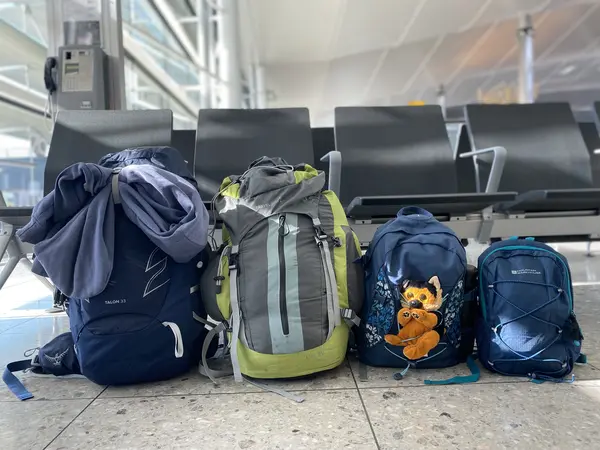
los cuatros backpackeros
Define being organized… I don’t know… some people are well oganised, some other are a total mess… maybe we are the middle… I mean… we still flighting on the other side of the ocean with 2 kids… something has to be planned…
Last 2 big trips, nothing was really planned…we travelled 2 months between Ecuador, Panama, Colombia and Mexico and 70% of the evenings we were looking for accommodations, itinerary, what do to..how to get out from a cheap island full of drunk Colombian families.. san Andres.. this time though…
We prepped ahead…oh boy if we did…
old age so I need proper sandals, not fully 9 months in hawaianas like in 2014… 2 nights googling..
same cheap island full of drunk Colombian families where we had to buy crappiest snorkelling masks for a fortune from a Chinese half warehouse 30 min before starting a paid snorkelling trip running with 2 sweaty kids…
…3 nights googling mask, what’s the best for the kiddos and what’s good for me and my big nose…
Shorts….damn cargo shorts… I am not tall (I will never write I am small), so I tried so many light cargo shorts I ended up wanting to go out in speedo… but hard to hide the phone on it…
…could of nights googling…
And thank god (I am atheist anyway) for LLMs…we tried any possible destination combo… surf snorkel jungle .. double checking itineraries, where we can sun cream with zinc for surfing, do they sell greek yogurt in the small pueblo of el transito?
Not that detailed, but quite some organization lasted 4 weeks.. where we were feeling so good about how good we were prepping…
And nevertheless, 3 days prior leaving has been hectic.. work and non stop packing and prepping house for renting it…
Last 2 big trips, nothing was really planned…we travelled 2 months between Ecuador, Panama, Colombia and Mexico and 70% of the evenings we were looking for accommodations, itinerary, what do to..how to get out from a cheap island full of drunk Colombian families.. san Andres.. this time though…
We prepped ahead…oh boy if we did…
old age so I need proper sandals, not fully 9 months in hawaianas like in 2014… 2 nights googling..
same cheap island full of drunk Colombian families where we had to buy crappiest snorkelling masks for a fortune from a Chinese half warehouse 30 min before starting a paid snorkelling trip running with 2 sweaty kids…
…3 nights googling mask, what’s the best for the kiddos and what’s good for me and my big nose…
Shorts….damn cargo shorts… I am not tall (I will never write I am small), so I tried so many light cargo shorts I ended up wanting to go out in speedo… but hard to hide the phone on it…
…could of nights googling…
And thank god (I am atheist anyway) for LLMs…we tried any possible destination combo… surf snorkel jungle .. double checking itineraries, where we can sun cream with zinc for surfing, do they sell greek yogurt in the small pueblo of el transito?
Not that detailed, but quite some organization lasted 4 weeks.. where we were feeling so good about how good we were prepping…
And nevertheless, 3 days prior leaving has been hectic.. work and non stop packing and prepping house for renting it…
Free beers
21 June 2025
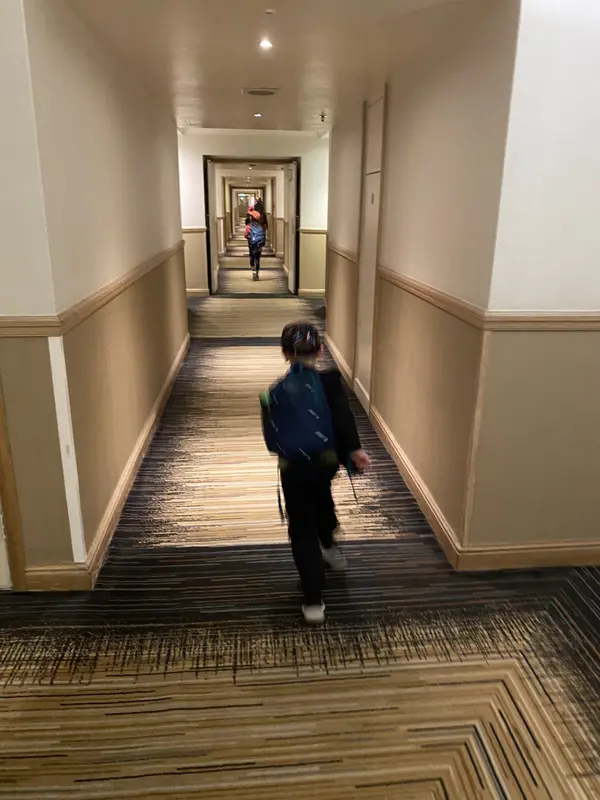
10 PM and a labyrinth hotel
Landed in London…London baby…warm and loads of people… luckily coming from Ireland no passport control (why did I buy ETA to go to UK? Nobody checked.. oh well…. As a traveller always good to support poor countries…
And now we need to find shuttle to the hotel… couple of floor with a busy and dumb elevator…why you have 6 elevators which do all 5 floors one by one, some floor up from arrival, some floor down f=.. instead of split and do 3 up and 3 down to speed up..misteries..
Anyway we finally managed to go 3 floor down… found the shuttle bus stop servicing multiple hotels..smart booking with a a QR code… but wait…why our hotel is not on the destinations? … oh nice discovering actually service to out hotel (of the all lot near heatrow) is only one which has been discontinued prior few months…
Checked again booking dot com where we booked hotel..shuttle is service is there on the booking…nice (sarcasm here)
Crap...
Ok it’s 10PM, kids are grumpy and warm, we ll have to spend 30 pounds on a uber…
Black cabs via uber a bit cheaper wait… wait..wait for uber but driver never assigned after 15 min…
Kids grumpiness continues..
Booked a standard uber.. 20 min and off we go….30 pounds for 6 minutes drive…London baby…
At the reception we gladly mentioned where is the bloody shuttle… oh apologies it was discontinued few months back…but we have some weird e-shuttle where u can share a cab if u book from the hotel and if u happen to go at peak times and pay 10 pound per person…kids included of course…
Yeah I definitely need more sarcasm here…
But…inconvenience is not cheap… so thanks to our complain…we get 2 free beer :)
And now we need to find shuttle to the hotel… couple of floor with a busy and dumb elevator…why you have 6 elevators which do all 5 floors one by one, some floor up from arrival, some floor down f=.. instead of split and do 3 up and 3 down to speed up..misteries..
Anyway we finally managed to go 3 floor down… found the shuttle bus stop servicing multiple hotels..smart booking with a a QR code… but wait…why our hotel is not on the destinations? … oh nice discovering actually service to out hotel (of the all lot near heatrow) is only one which has been discontinued prior few months…
Checked again booking dot com where we booked hotel..shuttle is service is there on the booking…nice (sarcasm here)
Crap...
Ok it’s 10PM, kids are grumpy and warm, we ll have to spend 30 pounds on a uber…
Black cabs via uber a bit cheaper wait… wait..wait for uber but driver never assigned after 15 min…
Kids grumpiness continues..
Booked a standard uber.. 20 min and off we go….30 pounds for 6 minutes drive…London baby…
At the reception we gladly mentioned where is the bloody shuttle… oh apologies it was discontinued few months back…but we have some weird e-shuttle where u can share a cab if u book from the hotel and if u happen to go at peak times and pay 10 pound per person…kids included of course…
Yeah I definitely need more sarcasm here…
But…inconvenience is not cheap… so thanks to our complain…we get 2 free beer :)
Smile
23 June 2025
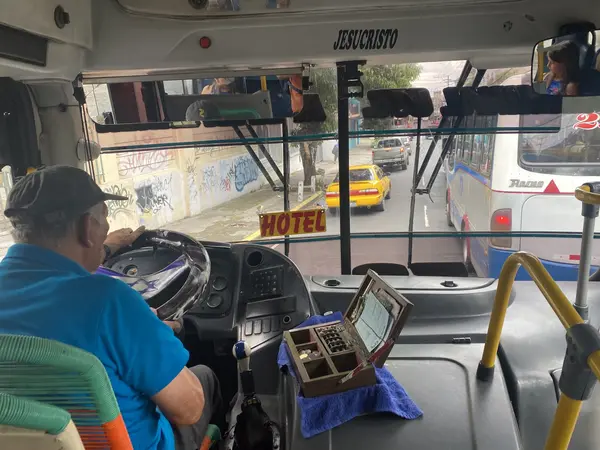
Old bus never dies
Wake up at 4 AM... well, technically the kids woke at 3:48 AM, ready to party, even though we went to bed around 11 last night (6 AM Cork time after that entire day of travel). My body wants to stay awake, but my mind does not. The smaller one is just refusing to sleep; the older one wants to but can't. She normally thrashes around in bed, so imagine that with jet lag and a body refusing to collapse.
After an hour-long battle trying to get their eyes to close, it's time to capitulate and turn on the TV. Still dark outside.
When the first light appears, I prep coffee... or at least I try. There's ground coffee but no coffee maker. The coffee smells nice, but it's so coarse that when I attempt a Turkish-style brew, I end up chewing coffee grounds. Oh well, there's worse.
There's a balcony overlooking the city with a big mountain volcano right in front—stunning. The air smells of rain and humidity and plants, such a change from Ireland.
At 6:30 AM, I head out to look for bread and milk at a nearby shop. The building guard smiles: "Buenos días." Outside our building, the road is lined with trees—such an intense smell of nature. Love it.
A hundred meters down, I meet another guard stationed outside another property. He smiles: "Buenos días." I manage to get bread, milk, and eggs, and on the way back, a woman is cooking something on a small truck. She smiles: "Buenos días." I ask what she's cooking.
"Pupusas," of course—their local food. I get three for a dollar and head back home, starving.
By 8 AM we're breakfasted and ready to roll—heading out to catch a bus to the city center. Woman at the bus stop smiles: "Buenos días." We ask her which bus goes to the center of San Salvador. She tells us the 52... the big bus, not the small 52. Yes, I'm puzzled.
Turns out there are small 20-seater buses and big old American school buses living their second lives—and even though they share the same number, they might not share the same route. :)
We board the right 52. The driver is cranky, smashing the clutch of this old bus. Every gear change feels like the gearbox is shifting its final gear.
And you know what? Even the cranky bus driver smiles at us.
Salvadoreñas smile even when they're cranky.
After an hour-long battle trying to get their eyes to close, it's time to capitulate and turn on the TV. Still dark outside.
When the first light appears, I prep coffee... or at least I try. There's ground coffee but no coffee maker. The coffee smells nice, but it's so coarse that when I attempt a Turkish-style brew, I end up chewing coffee grounds. Oh well, there's worse.
There's a balcony overlooking the city with a big mountain volcano right in front—stunning. The air smells of rain and humidity and plants, such a change from Ireland.
At 6:30 AM, I head out to look for bread and milk at a nearby shop. The building guard smiles: "Buenos días." Outside our building, the road is lined with trees—such an intense smell of nature. Love it.
A hundred meters down, I meet another guard stationed outside another property. He smiles: "Buenos días." I manage to get bread, milk, and eggs, and on the way back, a woman is cooking something on a small truck. She smiles: "Buenos días." I ask what she's cooking.
"Pupusas," of course—their local food. I get three for a dollar and head back home, starving.
By 8 AM we're breakfasted and ready to roll—heading out to catch a bus to the city center. Woman at the bus stop smiles: "Buenos días." We ask her which bus goes to the center of San Salvador. She tells us the 52... the big bus, not the small 52. Yes, I'm puzzled.
Turns out there are small 20-seater buses and big old American school buses living their second lives—and even though they share the same number, they might not share the same route. :)
We board the right 52. The driver is cranky, smashing the clutch of this old bus. Every gear change feels like the gearbox is shifting its final gear.
And you know what? Even the cranky bus driver smiles at us.
Salvadoreñas smile even when they're cranky.
worth 2 dollars
24 June 2025
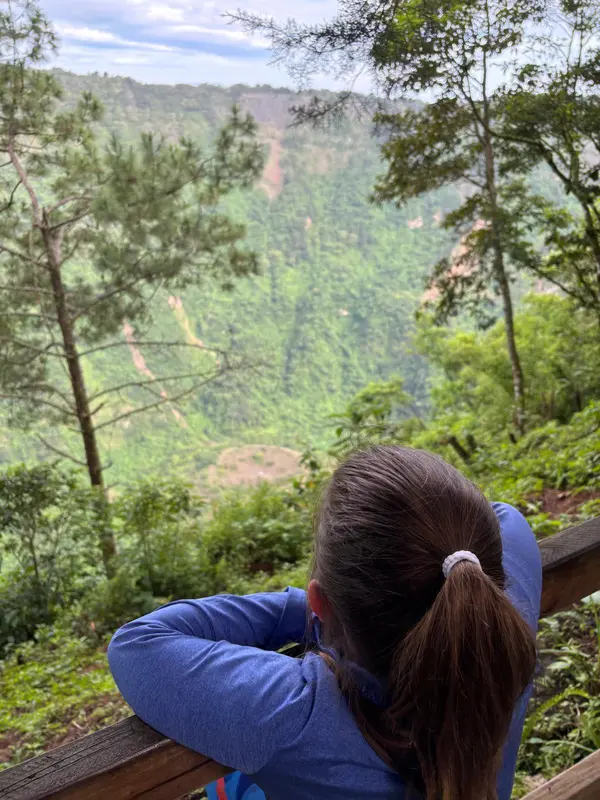
vulcano crater? check
Options for getting to El Boquerón: 40 minutes on a chicken bus plus another 40 minutes riding on the back of a pickup truck... or Uber for $7. Well, I can blame the kids (always convenient) for going with the Uber.
The taxi arrives at our hotel and the driver immediately states, "Mmm, the road Uber is giving me is wrong... need to take another route." Should I believe him? Do I have a choice? We're already going.
My question: "What do you mean the road is not there?"
He confirms: "Road does not exist."
My response: "I'm not going to pay you double."
He looks at me. "One, two dollars max more."
Bollocks.
Okay, do I really want to argue with an Uber driver at 7 AM when we're already on the road? Do I look like a tourist? Definitely. Should I bother fighting this? Would it be worth it? Probably not. (Again, I blame the kids for not being able to just open the door and bail while driving.)
And yes... I paid those two extra dollars.
But here's the thing—maybe he wasn't scamming me. Maybe Uber's mapping really is shit in rural El Salvador. Maybe that road genuinely doesn't exist, washed out by the last rainy season or never properly updated in Uber uses. Maybe I'm the rich tourist assuming the worst about a guy just trying to get me safely up a mountain.
Or maybe he saw "gringo with kids" and thought, "Easy two dollars more.”
I hate that…I am not a gringo.
But I am a tourist… did I arrive at destination? Yes. Did I paid those 2 dollars? Yes.
Was destination worth it? Looking to a crater from above…
The taxi arrives at our hotel and the driver immediately states, "Mmm, the road Uber is giving me is wrong... need to take another route." Should I believe him? Do I have a choice? We're already going.
My question: "What do you mean the road is not there?"
He confirms: "Road does not exist."
My response: "I'm not going to pay you double."
He looks at me. "One, two dollars max more."
Bollocks.
Okay, do I really want to argue with an Uber driver at 7 AM when we're already on the road? Do I look like a tourist? Definitely. Should I bother fighting this? Would it be worth it? Probably not. (Again, I blame the kids for not being able to just open the door and bail while driving.)
And yes... I paid those two extra dollars.
But here's the thing—maybe he wasn't scamming me. Maybe Uber's mapping really is shit in rural El Salvador. Maybe that road genuinely doesn't exist, washed out by the last rainy season or never properly updated in Uber uses. Maybe I'm the rich tourist assuming the worst about a guy just trying to get me safely up a mountain.
Or maybe he saw "gringo with kids" and thought, "Easy two dollars more.”
I hate that…I am not a gringo.
But I am a tourist… did I arrive at destination? Yes. Did I paid those 2 dollars? Yes.
Was destination worth it? Looking to a crater from above…
Panama
29 June 2025
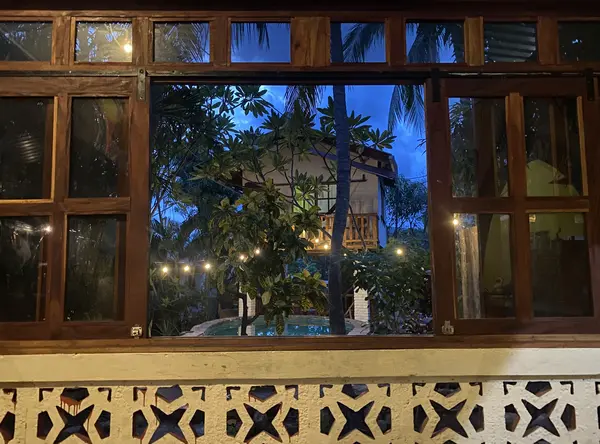
casita
The garden is full of trees—bananos, palms, other trees I have no clue how to name—but it's lush. Beautifully lush. Our house overlooks a small swimming pool, and beyond that sits the communal house where the owner sleeps, along with a few rooms for shared accommodation.
He's an incredible host. He owns a finca up in the mountains, 1,400 meters above sea level, where he grows coffee, lemons, and bananas. So we have free coffee, lemons, and bananas—all amazing.
Today is Sunday, and he's organized a small party by the pool. A woman and a guy join him, chilling in the water. There's a mix of Caribbean Latino and American music, a few beers, and everyone's enjoying the afternoon heat by staying in the cold water while me and the kids jump in and out of the pool.
We start chatting. The woman and guy are from Panama. I tell them I love Panama, and the guy starts saying that Panama and Italia are the best places on earth. He's a big mulatto guy—massively built with cornrow hair—and he begins reciting poetry to my son.
He hasn't had that much to drink, but he's funny. Every time we cross paths between the main house and the pool area, he recites with a loud voice and the dramatic pose of an actor doing Hamlet: "ITALIA!"
Him and the owner keep drinking, moving on to rum, until around 8 PM when everyone disappears.
I meet him the next morning in the communal kitchen. He's wearing just a towel around his waist, fresh out of the shower apparently. "Buenos días," I say.
"ITALIA!" he responds, still in full actor mode.
During breakfast, I notice he's staying in a small stilted house beside ours. I can see him cleaning up under the stilts where there's a small kitchen and some rubbish scattered around. He's also clearing the garden patch of small tree trunks and wood pieces. Still wearing that wrapped towel around his waist.
Then he's clearing more rubble on the side... still with the towel. Why? Why not wear trousers or shorts?
Then I get it. Hours later, I'm back from surfing and meet him again in the communal kitchen, towel still around his waist. "ITALIA!" Then he adds, "Work is good, ITALIA... work is good for the body."
I add, "And for the mind."
"¡Verdad!" he agrees. "Por el cuerpo y la mente," with his signature poetic pose.
Later, he's back wearing long trousers, chilling in the hammock (it's 30 degrees Celsius), and I understand: long trousers aren't good for working in this heat. Better to wear a towel.
PANAMA!
He's an incredible host. He owns a finca up in the mountains, 1,400 meters above sea level, where he grows coffee, lemons, and bananas. So we have free coffee, lemons, and bananas—all amazing.
Today is Sunday, and he's organized a small party by the pool. A woman and a guy join him, chilling in the water. There's a mix of Caribbean Latino and American music, a few beers, and everyone's enjoying the afternoon heat by staying in the cold water while me and the kids jump in and out of the pool.
We start chatting. The woman and guy are from Panama. I tell them I love Panama, and the guy starts saying that Panama and Italia are the best places on earth. He's a big mulatto guy—massively built with cornrow hair—and he begins reciting poetry to my son.
He hasn't had that much to drink, but he's funny. Every time we cross paths between the main house and the pool area, he recites with a loud voice and the dramatic pose of an actor doing Hamlet: "ITALIA!"
Him and the owner keep drinking, moving on to rum, until around 8 PM when everyone disappears.
I meet him the next morning in the communal kitchen. He's wearing just a towel around his waist, fresh out of the shower apparently. "Buenos días," I say.
"ITALIA!" he responds, still in full actor mode.
During breakfast, I notice he's staying in a small stilted house beside ours. I can see him cleaning up under the stilts where there's a small kitchen and some rubbish scattered around. He's also clearing the garden patch of small tree trunks and wood pieces. Still wearing that wrapped towel around his waist.
Then he's clearing more rubble on the side... still with the towel. Why? Why not wear trousers or shorts?
Then I get it. Hours later, I'm back from surfing and meet him again in the communal kitchen, towel still around his waist. "ITALIA!" Then he adds, "Work is good, ITALIA... work is good for the body."
I add, "And for the mind."
"¡Verdad!" he agrees. "Por el cuerpo y la mente," with his signature poetic pose.
Later, he's back wearing long trousers, chilling in the hammock (it's 30 degrees Celsius), and I understand: long trousers aren't good for working in this heat. Better to wear a towel.
PANAMA!
40 dollars
30 June 2025
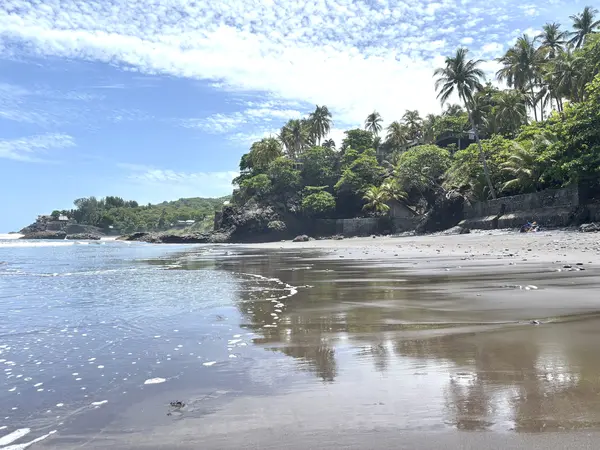
before big buildings take over..
El Zonte beach is where we're staying. There's the surfing beach—rocky, sketchy entrance, big waves crashing to shore. Impossible to swim, definitely not safe to have kids playing nearby.
Then there's another, more sandy beach 10-15 minutes from our hotel (the exact time depends on how much the kids complain, try to strike, and stay put in the heat under the sun, begging to be carried to the beach in our arms).
So we walk. The two beaches are separated by a river, but there's a walking bridge from our accommodation that continues between two properties, both lined with barbed wire. Inside: chickens and some barking dogs. The path finally leads to the main road and the sandy beach.
While we try to find shade between big palm trees, we dodge slow cars and workers (everywhere in El Zonte is a building site). As we're stepping between parked cars, my daughter quickly spots something on the ground and finds $40. Niceeeeee!
We arrive at the beach. She takes off her shirt, and while I'm still unpacking and fighting with my son to cover him with sunscreen, she's already playing in the water.
The waves here are less strong—or at least the sandy beach allows a kid to enter and play in shallow water. We join her, and they both start jumping over the waves. She dives under one and comes out crying, keeping her hands on her belly.
She jumped over a wave but landed on a massive underwater rock, making a decent scratch across her belly. She's crying hard, so my wife gets out of the water with her while her brother keeps jumping on waves. I drag him away from that rock area and keep playing while we get smashed wave after wave.
After 10 minutes of crying, she finally comes back into the water. I hug her, and looking at me she says, "Well... I just found $40. I can buy enough plasters to cover my scratches and still have quite a bit of money left over."
I love her. Kids are amazing.
Then there's another, more sandy beach 10-15 minutes from our hotel (the exact time depends on how much the kids complain, try to strike, and stay put in the heat under the sun, begging to be carried to the beach in our arms).
So we walk. The two beaches are separated by a river, but there's a walking bridge from our accommodation that continues between two properties, both lined with barbed wire. Inside: chickens and some barking dogs. The path finally leads to the main road and the sandy beach.
While we try to find shade between big palm trees, we dodge slow cars and workers (everywhere in El Zonte is a building site). As we're stepping between parked cars, my daughter quickly spots something on the ground and finds $40. Niceeeeee!
We arrive at the beach. She takes off her shirt, and while I'm still unpacking and fighting with my son to cover him with sunscreen, she's already playing in the water.
The waves here are less strong—or at least the sandy beach allows a kid to enter and play in shallow water. We join her, and they both start jumping over the waves. She dives under one and comes out crying, keeping her hands on her belly.
She jumped over a wave but landed on a massive underwater rock, making a decent scratch across her belly. She's crying hard, so my wife gets out of the water with her while her brother keeps jumping on waves. I drag him away from that rock area and keep playing while we get smashed wave after wave.
After 10 minutes of crying, she finally comes back into the water. I hug her, and looking at me she says, "Well... I just found $40. I can buy enough plasters to cover my scratches and still have quite a bit of money left over."
I love her. Kids are amazing.
Long ride
1 July 2025
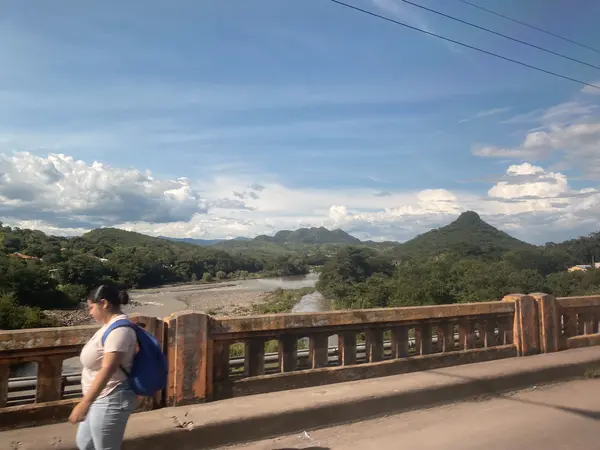
el salvador - honduras | frontera
I was told... "You'll see when you have kids. You did backpacking in Asia, but then... you'll have kids and you cannot travel anymore. That's it. You cannot backpack with kids."
Things we saw on a 12-Hour Shuttle Journey with Kids..
(And we took a shuttle because doing the same travel with chicken buses was on my wife's mind, but not really on mine.)
Plantations—sugar cane, corn, something else I couldn't identify.
One kilometer of stalls, one after the other, selling bananas after bananas.
Houses being built here and there. Lots of construction ongoing.
Tin roofs in El Salvador, terracotta tiles in Honduras.
Old women sitting in the shade selling coconuts. Will they ever sell them?
Pre-cut fruits on roadside stalls. Same..
Very expensive, American-style petrol station—but good food. Amazing costillas.
Land of cows and horses.
Cars overtaking each other at high speed while people just stand on the sunny side of the road. How were they not blown away by the wind?
Volcano shapes in the distance.
Everything green and lush.
"Pollo Campestre" signs. American food chains in every major crossroads.
A massive tree split open by lightning.
A sign stating "Tortillas and Coco 5725" in the middle of nowhere.
"Ciudad Profética Iglesia del Sión." Iglesias here and there..
We stop in a petrol station. I get water and popsicles... Cashier says 44. Forty-four what? Exactly. I have no clue about the exchange rate in Honduras..
Old-style chewing gum—long, flat strips. My daughter looks at them and asks, "What are these?" Me and my wife started laughing...never saw a good old chewing gum?
Things we saw on a 12-Hour Shuttle Journey with Kids..
(And we took a shuttle because doing the same travel with chicken buses was on my wife's mind, but not really on mine.)
Plantations—sugar cane, corn, something else I couldn't identify.
One kilometer of stalls, one after the other, selling bananas after bananas.
Houses being built here and there. Lots of construction ongoing.
Tin roofs in El Salvador, terracotta tiles in Honduras.
Old women sitting in the shade selling coconuts. Will they ever sell them?
Pre-cut fruits on roadside stalls. Same..
Very expensive, American-style petrol station—but good food. Amazing costillas.
Land of cows and horses.
Cars overtaking each other at high speed while people just stand on the sunny side of the road. How were they not blown away by the wind?
Volcano shapes in the distance.
Everything green and lush.
"Pollo Campestre" signs. American food chains in every major crossroads.
A massive tree split open by lightning.
A sign stating "Tortillas and Coco 5725" in the middle of nowhere.
"Ciudad Profética Iglesia del Sión." Iglesias here and there..
We stop in a petrol station. I get water and popsicles... Cashier says 44. Forty-four what? Exactly. I have no clue about the exchange rate in Honduras..
Old-style chewing gum—long, flat strips. My daughter looks at them and asks, "What are these?" Me and my wife started laughing...never saw a good old chewing gum?
Formula
2 July 2025
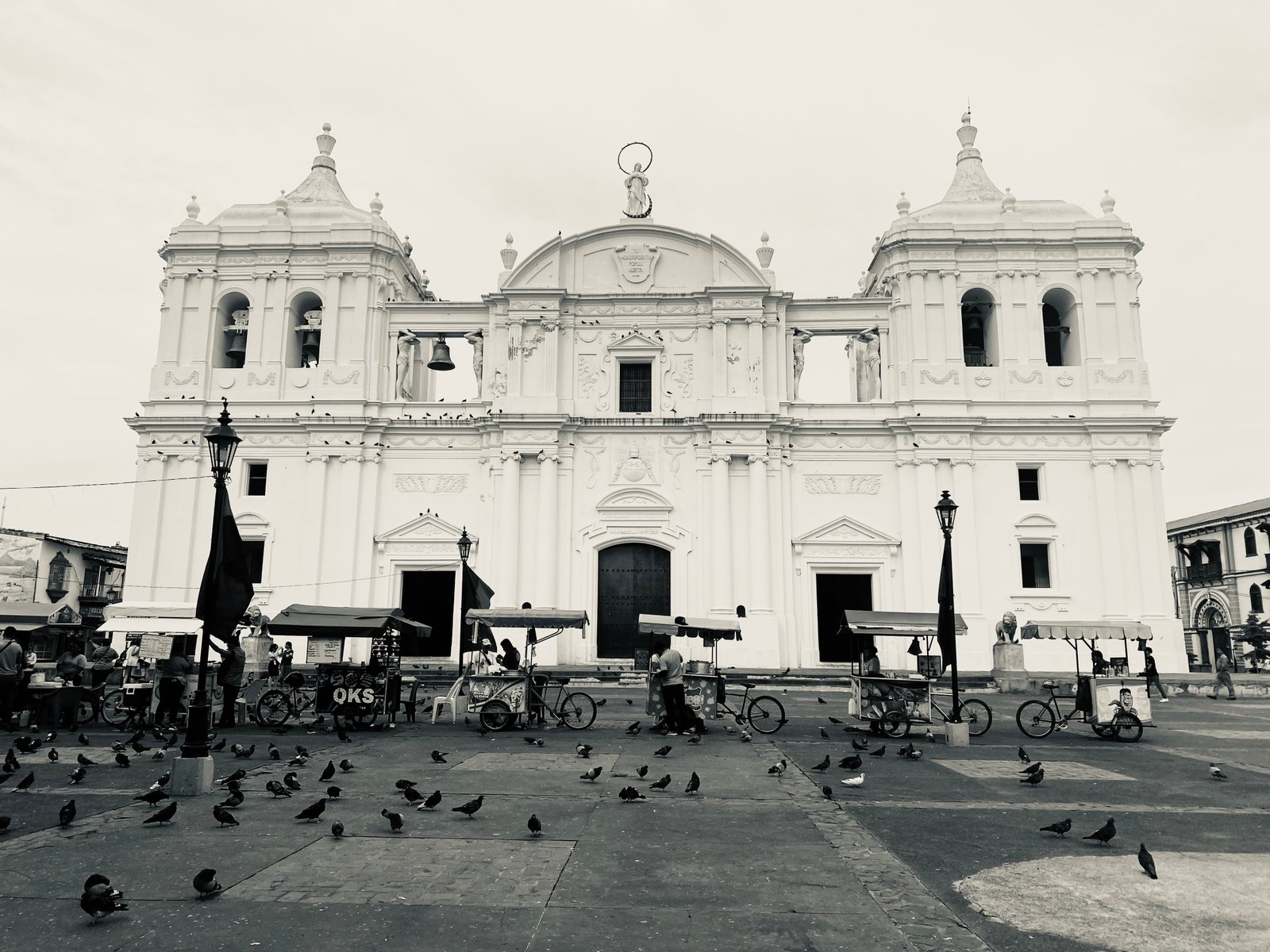
León Cathedral
I'm sitting on the steps of the León Cathedral—this amazing white building in the middle of town, UNESCO World Heritage and all that.
A woman approaches me. "Can you understand Spanish?" she asks. I say I can a bit... first mistake.
She tells me a story. She doesn't want money—her baby is 8 months old, sick in the hospital, and she just needs formula or diapers. We actually just arrived in Nicaragua, so I have no money, and my wife just went to withdraw some.
I want to give her a dollar left from San Salvador, but I actually have none. I look at her—she really looks poor. And she tells me, "Just buy me formula in the pharmacy here on the side of the square. I don't need any cash."
The formula... 95% this is the formula of a good scam. But there's a 5% I want to believe—believe in humanity and not think everything is a scam. So I actually follow her around the corner of the square, thinking I'm an idiot. I'm following a random woman in an unknown city, but hey, the pharmacy is only around the corner of the cathedral... and it truly is. Otherwise I would have bailed out and left.
So I enter the pharmacy with her. The pharmacist looks at me—he's thinking "she's scamming you." He looks at her—"you're scamming him." I look at the pharmacist looking at me thinking "I'm being scammed," and I look at the pharmacist looking at her thinking "she's scamming me." And the percentage of being scammed goes higher to a good 98%.
I buy her milk formula. Oh well, I probably got scammed four dollars' worth. I did bet on the reality of her story though. She thanks me and I leave, feeling like a hopeless and naive idiot. And maybe that money she really used for some good... or at least, that's what I want to believe... in humanity, I mean.
A woman approaches me. "Can you understand Spanish?" she asks. I say I can a bit... first mistake.
She tells me a story. She doesn't want money—her baby is 8 months old, sick in the hospital, and she just needs formula or diapers. We actually just arrived in Nicaragua, so I have no money, and my wife just went to withdraw some.
I want to give her a dollar left from San Salvador, but I actually have none. I look at her—she really looks poor. And she tells me, "Just buy me formula in the pharmacy here on the side of the square. I don't need any cash."
The formula... 95% this is the formula of a good scam. But there's a 5% I want to believe—believe in humanity and not think everything is a scam. So I actually follow her around the corner of the square, thinking I'm an idiot. I'm following a random woman in an unknown city, but hey, the pharmacy is only around the corner of the cathedral... and it truly is. Otherwise I would have bailed out and left.
So I enter the pharmacy with her. The pharmacist looks at me—he's thinking "she's scamming you." He looks at her—"you're scamming him." I look at the pharmacist looking at me thinking "I'm being scammed," and I look at the pharmacist looking at her thinking "she's scamming me." And the percentage of being scammed goes higher to a good 98%.
I buy her milk formula. Oh well, I probably got scammed four dollars' worth. I did bet on the reality of her story though. She thanks me and I leave, feeling like a hopeless and naive idiot. And maybe that money she really used for some good... or at least, that's what I want to believe... in humanity, I mean.
Ray Charles
2 July 2025
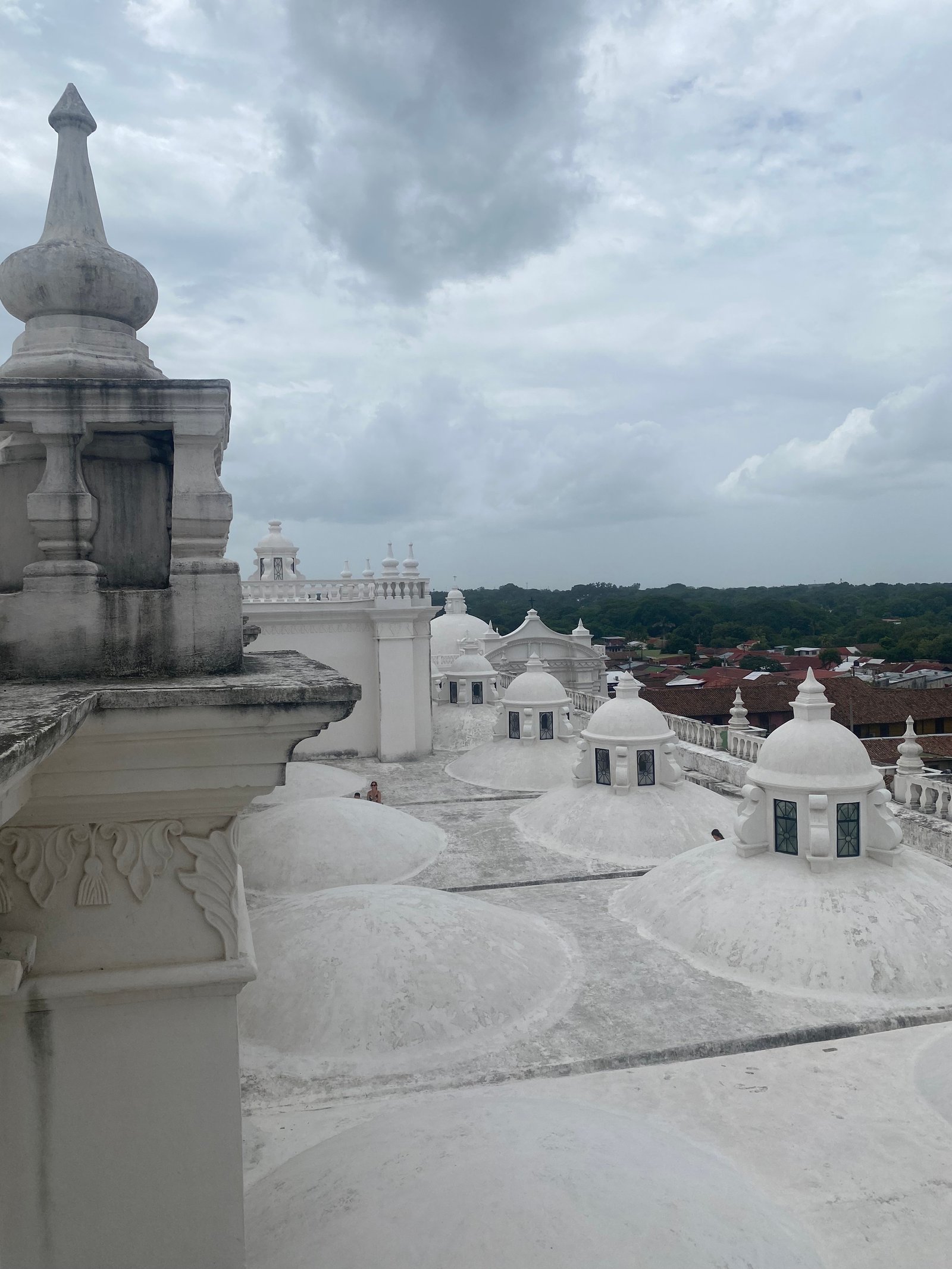
hide and seek
On the side of the cathedral there's a small door that leads to some small stairs which allow you to climb up and walk on its roof. But you need to get the ticket first.
For the ticket, you go to the other side of the cathedral, where there's another small door guarded by an old man with a baseball cap and Ray Charles glasses—acting blind even if he's not—who gestures for us to enter inside this door. A 10-meter narrow corridor brings us to another man who asks for 3 dollars.
But efectivo (cash) and with no change, so we have to get out of the narrow corridor, cross the street dodging taxis and cars, and change my banknote for small change from a man lounging on a rocking chair with Ray Charles-style glasses and with an arm lifted holding such a roll of banknotes it can barely fit in one hand. He's not blind for sure, and he changes the money into smaller banknotes.
So we get back to the other Ray Charles and the man in the corridor, who happily hands us over a torn piece of paper with some unreadable scribble that seems to allow us to finally get to the roof.
The whole cathedral is white—feels like walking on snow but with 30 degrees of heat instead. From this white top you can oversee all of the small city of León: beautiful greenery around, other churches in the distance, some volcanoes on the horizon.
We're lucky—there are almost no tourists there. We explore this white roof, flat with some cupolas that are not allowed to climb. The back of the cathedral is cordoned with some yellow and black tape to prevent entrance.
From there, a few people come out, and my son immediately spots it and asks, "Daddy, why are people there?"
And I reply in English, "Because they're not supposed to be there"—very confident response. At which one of the women from the mentioned group looks at me and replies, "No, you're not supposed to be there because it's risky and the cupolas collapse."
That's when I realize my son is actually climbing the cupolas too, as the woman switches to Spanish and starts talking to someone else, saying that while I was complaining, my kid is actually doing the same... oooooops. Talk about the devil.
For the ticket, you go to the other side of the cathedral, where there's another small door guarded by an old man with a baseball cap and Ray Charles glasses—acting blind even if he's not—who gestures for us to enter inside this door. A 10-meter narrow corridor brings us to another man who asks for 3 dollars.
But efectivo (cash) and with no change, so we have to get out of the narrow corridor, cross the street dodging taxis and cars, and change my banknote for small change from a man lounging on a rocking chair with Ray Charles-style glasses and with an arm lifted holding such a roll of banknotes it can barely fit in one hand. He's not blind for sure, and he changes the money into smaller banknotes.
So we get back to the other Ray Charles and the man in the corridor, who happily hands us over a torn piece of paper with some unreadable scribble that seems to allow us to finally get to the roof.
The whole cathedral is white—feels like walking on snow but with 30 degrees of heat instead. From this white top you can oversee all of the small city of León: beautiful greenery around, other churches in the distance, some volcanoes on the horizon.
We're lucky—there are almost no tourists there. We explore this white roof, flat with some cupolas that are not allowed to climb. The back of the cathedral is cordoned with some yellow and black tape to prevent entrance.
From there, a few people come out, and my son immediately spots it and asks, "Daddy, why are people there?"
And I reply in English, "Because they're not supposed to be there"—very confident response. At which one of the women from the mentioned group looks at me and replies, "No, you're not supposed to be there because it's risky and the cupolas collapse."
That's when I realize my son is actually climbing the cupolas too, as the woman switches to Spanish and starts talking to someone else, saying that while I was complaining, my kid is actually doing the same... oooooops. Talk about the devil.
Singing
3 July 2025
While traveling between tourist destinations, you usually have a few options depending on budget, timing, but most importantly patience.
We need to reach Managua airport from León, to then fly to the Corn Islands, and we have the option to pay 21 dollars each for a shared shuttle (which will be quite tight to make it for our flight) or 80 dollars for private transport.
Wait... there's a third option: do like the locals.
We wake up early, get a taxi to the local bus station next to the market, busy and bustling with rickshaws, cars, people selling fruit and snacks, others transporting never-ending boxes, all shouting and honking.
The taxi drops us off at a shuttle bus, where in no time we're sitting ready to go as there were just 3 places left to be filled up. We're 4 actually, meaning my son will travel on our lap.
Travel's not too bad (7 dollars btw), air-con and everyone has their own seat (apart from my son). Kids are distracted (music and iPad) so in 2 hours we're in Managua, immediately surrounded by taxi drivers who want to bring us to the airport.
"Airport, 20 dollars."
I look at him: "20 dollars? No kidding."
"Ok, 600 córdobas" (already 15 dollars).
I look at him again... "No."
"Ok, 13 dollars."
"No no," I tell him, "we'll look for a bite and then we talk." They keep pestering while we get some snacks and ask people around how to get to the airport.
They tell us to cross the road and take 2 bus, first one 100 meters from the main bus stop, giving us a name where to change which I don't really get. We cross those 100 meters, ask again, and finally they point us in the right direction.
We hop on the first bus (for 50 cents more) and cross Managua.
At some point, 2 teenagers dressed in 2Pac t-shirts and Nike enter the bus, and one of them starts to shout. Seems there's a fight between him and some other people. The shouts don't stop. I'm in the front of the bus with 2 backpacks and I can't turn to see what's happening, but it sounds like commotion. My daughter next to me seems worried. I'm just thinking I don't want to be in the middle of a fight.
Then I understand... the kids are doing freestyle—some love-hate serenade shouted and improvised. They pass around asking for money and hop off the bus.
As soon as they get off, my daughter looks at me: "Daddy, I have to tell you... they hurt my ears."
And that's it. She leaves me smiling and wondering if I should file a complaint with the Managua bus company or not..
We need to reach Managua airport from León, to then fly to the Corn Islands, and we have the option to pay 21 dollars each for a shared shuttle (which will be quite tight to make it for our flight) or 80 dollars for private transport.
Wait... there's a third option: do like the locals.
We wake up early, get a taxi to the local bus station next to the market, busy and bustling with rickshaws, cars, people selling fruit and snacks, others transporting never-ending boxes, all shouting and honking.
The taxi drops us off at a shuttle bus, where in no time we're sitting ready to go as there were just 3 places left to be filled up. We're 4 actually, meaning my son will travel on our lap.
Travel's not too bad (7 dollars btw), air-con and everyone has their own seat (apart from my son). Kids are distracted (music and iPad) so in 2 hours we're in Managua, immediately surrounded by taxi drivers who want to bring us to the airport.
"Airport, 20 dollars."
I look at him: "20 dollars? No kidding."
"Ok, 600 córdobas" (already 15 dollars).
I look at him again... "No."
"Ok, 13 dollars."
"No no," I tell him, "we'll look for a bite and then we talk." They keep pestering while we get some snacks and ask people around how to get to the airport.
They tell us to cross the road and take 2 bus, first one 100 meters from the main bus stop, giving us a name where to change which I don't really get. We cross those 100 meters, ask again, and finally they point us in the right direction.
We hop on the first bus (for 50 cents more) and cross Managua.
At some point, 2 teenagers dressed in 2Pac t-shirts and Nike enter the bus, and one of them starts to shout. Seems there's a fight between him and some other people. The shouts don't stop. I'm in the front of the bus with 2 backpacks and I can't turn to see what's happening, but it sounds like commotion. My daughter next to me seems worried. I'm just thinking I don't want to be in the middle of a fight.
Then I understand... the kids are doing freestyle—some love-hate serenade shouted and improvised. They pass around asking for money and hop off the bus.
As soon as they get off, my daughter looks at me: "Daddy, I have to tell you... they hurt my ears."
And that's it. She leaves me smiling and wondering if I should file a complaint with the Managua bus company or not..
Plane
3 July 2025
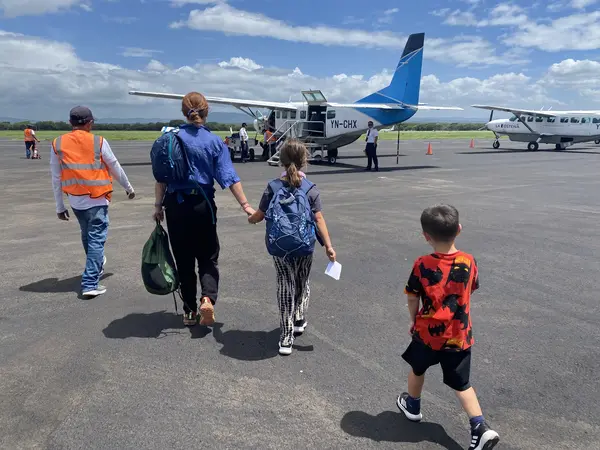
no turning back
We're flying to the Corn Islands—2 small islands on the Caribbean Atlantic side of Nicaragua. Big Corn Island and Little Corn Island. Big Corn is more touristic, with even an airport. Little Corn is less touristic, only reachable with a 30-minute panga ride via Big Corn Island.
Our first leg is flying from Managua to Big Corn Island.
Booking was already an experience, as the website didn't accept any of my cards, so I had to reach them via WhatsApp. Chatting away, we got our tickets.
Managua's domestic airport is very small... very small. At the gate there's a scale—first they weigh my luggage, then me and my luggage. Then a quick security check (no liquids out, no laptop out, just a quick scan) and we're inside a 20-seater terminal.
Outside, 3 planes are parked: 2 pretty small and 1 a bit bigger with double rotors. Looks like they're getting it ready for the flight.
We joke with our families, sending a picture of the small planes and texting them, "For a bit we thought we would fly in the small plane." AHAHAHAHA ... We laugh... big laugh.
Not for long. We're actually flying in the small one.
12 passengers plus 2 pilots.
This is hilarious.
We learn that the main runway on Big Corn Island is getting repaired, so at the moment there's only space to land a small plane.
We get onboard, and as soon as all 12 passengers are sitting, off we go. I was used to safety belt checks, pilot speaking... something... nope. We're just going.
Two rows behind me, the pilots are sitting, and in front of them... blue sky. The flight is smooth, so smooth that one of the 2 pilots has a snooze while the other flies and enjoys the view. And we... we enjoy the view and the great feeling of sitting even more comfortably than on a Ryanair flight.
Our first leg is flying from Managua to Big Corn Island.
Booking was already an experience, as the website didn't accept any of my cards, so I had to reach them via WhatsApp. Chatting away, we got our tickets.
Managua's domestic airport is very small... very small. At the gate there's a scale—first they weigh my luggage, then me and my luggage. Then a quick security check (no liquids out, no laptop out, just a quick scan) and we're inside a 20-seater terminal.
Outside, 3 planes are parked: 2 pretty small and 1 a bit bigger with double rotors. Looks like they're getting it ready for the flight.
We joke with our families, sending a picture of the small planes and texting them, "For a bit we thought we would fly in the small plane." AHAHAHAHA ... We laugh... big laugh.
Not for long. We're actually flying in the small one.
12 passengers plus 2 pilots.
This is hilarious.
We learn that the main runway on Big Corn Island is getting repaired, so at the moment there's only space to land a small plane.
We get onboard, and as soon as all 12 passengers are sitting, off we go. I was used to safety belt checks, pilot speaking... something... nope. We're just going.
Two rows behind me, the pilots are sitting, and in front of them... blue sky. The flight is smooth, so smooth that one of the 2 pilots has a snooze while the other flies and enjoys the view. And we... we enjoy the view and the great feeling of sitting even more comfortably than on a Ryanair flight.
Pollo
4 July 2025
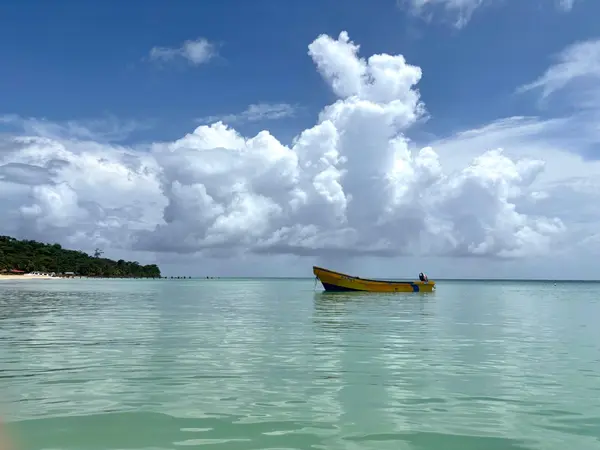
chill corn island life
I'm walking on the road that follows the coast around Big Corn Island, checking a snorkeling spot since the day before it was too windy and choppy for the kids to try and dive in. Apparently that's the best spot to snorkel without a boat. The road bends around small promontories and goes up and down a few times before reaching this famous reef in front of Victoria Bar.
Some guy shouts at me from a small alcove along the road: "Hey amigo!" I look down and see 2 youngsters, one cleaning a harpoon, the other skinning some big fish with a big blade, machete-style.
Lobster cages and a small panga next to them, and lots of rubbish all around.
One of the two guys shouts at me to come over to them.
I go down a few steps leading to the small beach. We shake hands and exchange names.
"Want to go spearfishing?"
"Big fish, man, we just go there," pointing to a reef just 100 meters out.
"Easy to catch big ones, there's plenty," says the other. "Then we roast it and eat it."
They really want to convince me.
They have two large wooden spearguns next to them, ready, and they ask me if I've ever spearfished. "I never did," I reply.
And the guy who's still holding a machete and a 2kg chunk of fish keeps on, trying to convince me:
"Best feeling in the world... go under and bang, you shoot that thing... kill it, then you cook it and eat it.
It's like... like... like when you see a chicken and bang, best feeling in the world..." swinging the machete, mimicking the action to chop a chicken with that big fat knife.
I cannot not agree, from my big personal experience of chopping chickens with machetes.
I tell them I'll think about it, even though my picturesque spearfishing wish is now muddied with dead chickens.
Some guy shouts at me from a small alcove along the road: "Hey amigo!" I look down and see 2 youngsters, one cleaning a harpoon, the other skinning some big fish with a big blade, machete-style.
Lobster cages and a small panga next to them, and lots of rubbish all around.
One of the two guys shouts at me to come over to them.
I go down a few steps leading to the small beach. We shake hands and exchange names.
"Want to go spearfishing?"
"Big fish, man, we just go there," pointing to a reef just 100 meters out.
"Easy to catch big ones, there's plenty," says the other. "Then we roast it and eat it."
They really want to convince me.
They have two large wooden spearguns next to them, ready, and they ask me if I've ever spearfished. "I never did," I reply.
And the guy who's still holding a machete and a 2kg chunk of fish keeps on, trying to convince me:
"Best feeling in the world... go under and bang, you shoot that thing... kill it, then you cook it and eat it.
It's like... like... like when you see a chicken and bang, best feeling in the world..." swinging the machete, mimicking the action to chop a chicken with that big fat knife.
I cannot not agree, from my big personal experience of chopping chickens with machetes.
I tell them I'll think about it, even though my picturesque spearfishing wish is now muddied with dead chickens.
Eggs
5 July 2025
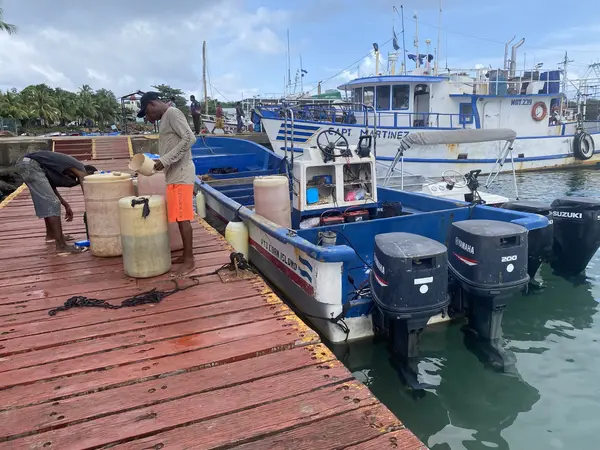
filling up miscela for our panga
We ask the lady in our homestay when it's better to go to the pier to catch the panga (small boat) from Big to Little Corn Island, which is set to leave every day at 10 AM.
Her response is typical from the island:
"You go at 8, it's good... you can go at 8:30 and it's fine... you go at 9, fine too."
When do I have to go? I'm a European dude who would like to get that boat, not remain stuck here for the whole day again (panga leaves twice daily, so I was told).
So I figure out, at 8 we try to catch a taxi to head to the pier. We're just 10 minutes from it, along the main coastal route where taxis are constantly looping around. Taxis are some 4-seater tiniest-ever cars that even big island local guys drive, and I have no clue how they managed to enter and seat in them.
So we wake up early, ready to flag a taxi on the road by 8, and by 8 it's pissing tropical lashing rain.
So we wait—anyway, the lady of the house said 8:30 is fine. It pisses rain for 15 minutes, then I stand on the road for a while but no taxi, of course. Then it starts to piss rain again, so we wait. Then again no taxi passes and it's approaching 9 AM, so we ask the lady to call for a taxi, which she does (even though from her face it was clear she was wondering why we would ever be worried).
Taxi arrives (he's a very big guy, must be welded in this car—no way he can get out of it) and we arrive at the pier, where we discover the morning panga only leaves if there are a minimum of 15 people... and we're at 8 with us.
So we wait an hour to then move to a nearby beach for some food and a swim. We're then back at the pier by 3—panga is now leaving for sure and a few more tourists and locals are starting to roam around the small port.
Our backpacks are put safely in the boat, but I still have my main backpack (passport, cash, laptop, camera) where everything is sealed with IKEA bags (thanks IKEA from the other side of the world).
But I still see people wrapping their handbags in big plastic bags... mmmm... looks like it'll be wet. I know it's a 30-minute ride and it can get wet.
Slowly we board and the boat is full... the boat looks full to me, while a woman arrives balancing a paperboard slab of 100 eggs on the palm of her hands... and she boards too, the speedboat on the front seats.
And we wonder about those eggs flying to the back after the boat hits the first wave.
While boarding, my wife had asked one of the guys if it would rain, and the guy had confirmed, "No ma'am, no rain at all."
And in fact it does not rain at all. I only just get completely soaked by splashes of the waves. We actually all get slaps of water in the face, and while we laugh at each other getting pounded and soaked, my son starts to shout, "The eggs!! The eggs are breaking!!!"
Her response is typical from the island:
"You go at 8, it's good... you can go at 8:30 and it's fine... you go at 9, fine too."
When do I have to go? I'm a European dude who would like to get that boat, not remain stuck here for the whole day again (panga leaves twice daily, so I was told).
So I figure out, at 8 we try to catch a taxi to head to the pier. We're just 10 minutes from it, along the main coastal route where taxis are constantly looping around. Taxis are some 4-seater tiniest-ever cars that even big island local guys drive, and I have no clue how they managed to enter and seat in them.
So we wake up early, ready to flag a taxi on the road by 8, and by 8 it's pissing tropical lashing rain.
So we wait—anyway, the lady of the house said 8:30 is fine. It pisses rain for 15 minutes, then I stand on the road for a while but no taxi, of course. Then it starts to piss rain again, so we wait. Then again no taxi passes and it's approaching 9 AM, so we ask the lady to call for a taxi, which she does (even though from her face it was clear she was wondering why we would ever be worried).
Taxi arrives (he's a very big guy, must be welded in this car—no way he can get out of it) and we arrive at the pier, where we discover the morning panga only leaves if there are a minimum of 15 people... and we're at 8 with us.
So we wait an hour to then move to a nearby beach for some food and a swim. We're then back at the pier by 3—panga is now leaving for sure and a few more tourists and locals are starting to roam around the small port.
Our backpacks are put safely in the boat, but I still have my main backpack (passport, cash, laptop, camera) where everything is sealed with IKEA bags (thanks IKEA from the other side of the world).
But I still see people wrapping their handbags in big plastic bags... mmmm... looks like it'll be wet. I know it's a 30-minute ride and it can get wet.
Slowly we board and the boat is full... the boat looks full to me, while a woman arrives balancing a paperboard slab of 100 eggs on the palm of her hands... and she boards too, the speedboat on the front seats.
And we wonder about those eggs flying to the back after the boat hits the first wave.
While boarding, my wife had asked one of the guys if it would rain, and the guy had confirmed, "No ma'am, no rain at all."
And in fact it does not rain at all. I only just get completely soaked by splashes of the waves. We actually all get slaps of water in the face, and while we laugh at each other getting pounded and soaked, my son starts to shout, "The eggs!! The eggs are breaking!!!"
Dark
5 July 2025
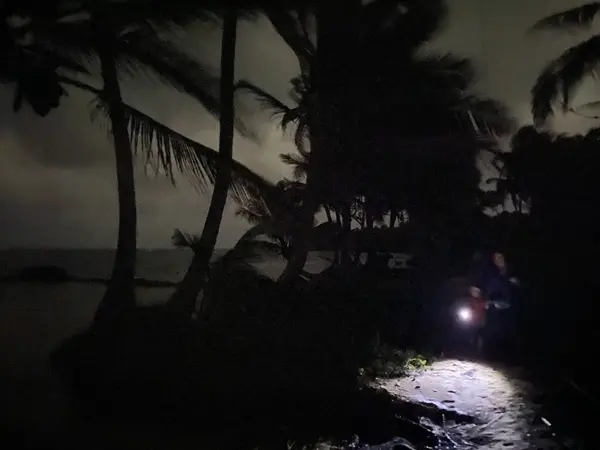
crab walk
First night on Little Corn Island and like in every new place, the first mission is always the same. Where can we eat?
Where can I manage to feed my Michelin palate and the "I-no-like-it" from the kids while ensuring a balanced intake of proteins, carbs, fried chicken, gallo pinto, and healthy fats? (Disclaimer: gallo pinto and fried chicken is 50% of our diet). But most important... where is the cheap eatery?
Our hotel restaurant is a bit pricey and closing, so we ask where we could get food. "Just walk along the shore," they tell us, "and you will find some."
So we walk... but wait, it's getting dark actually, so we take our torches and start to walk along the beach. Nearby we meet some american family we had met before on the boat, with torches too, and like us they are looking for some place to eat.
So we join forces and start to walk along the shore and in between palm trees, exploring for the first time the island in the dark.
I am amazed. Me and my son are slower so we get separated from main group. I give him the headlamp, and he is bravely walking along broken coconuts and crabs, following a small trail within some smaller plants grown on the sand.
We find some places with some cabanas where the only light is from a man watching his phone. He tells us there is no electricity across the island and because of some storm the boat carrying petrol for the generators didn't arrive.
And he tells us to keep on walking... maybe the next place will have some food. We walk a few minutes more in some grassy patch and find other little huts just in front of the water, waves almost splashing the porch.
Also there, the only light is a man on a hammock swinging in one of the huts, watching his phone, who tells us the same story. No electricity and no food.
And he also tells me something else... there might be no electricity, but there is 4G :)
Our bellies are grumbling. The trail along the beach stops and goes inland where we finally see some lights. This restaurant has a private generator and thanks to that we manage to get a nice dinner.
Before another dark walk, jumping over crabs and the light of the moon just coming out showing palm fronds on the night sky.
Where can I manage to feed my Michelin palate and the "I-no-like-it" from the kids while ensuring a balanced intake of proteins, carbs, fried chicken, gallo pinto, and healthy fats? (Disclaimer: gallo pinto and fried chicken is 50% of our diet). But most important... where is the cheap eatery?
Our hotel restaurant is a bit pricey and closing, so we ask where we could get food. "Just walk along the shore," they tell us, "and you will find some."
So we walk... but wait, it's getting dark actually, so we take our torches and start to walk along the beach. Nearby we meet some american family we had met before on the boat, with torches too, and like us they are looking for some place to eat.
So we join forces and start to walk along the shore and in between palm trees, exploring for the first time the island in the dark.
I am amazed. Me and my son are slower so we get separated from main group. I give him the headlamp, and he is bravely walking along broken coconuts and crabs, following a small trail within some smaller plants grown on the sand.
We find some places with some cabanas where the only light is from a man watching his phone. He tells us there is no electricity across the island and because of some storm the boat carrying petrol for the generators didn't arrive.
And he tells us to keep on walking... maybe the next place will have some food. We walk a few minutes more in some grassy patch and find other little huts just in front of the water, waves almost splashing the porch.
Also there, the only light is a man on a hammock swinging in one of the huts, watching his phone, who tells us the same story. No electricity and no food.
And he also tells me something else... there might be no electricity, but there is 4G :)
Our bellies are grumbling. The trail along the beach stops and goes inland where we finally see some lights. This restaurant has a private generator and thanks to that we manage to get a nice dinner.
Before another dark walk, jumping over crabs and the light of the moon just coming out showing palm fronds on the night sky.
Foreign driftwood
8 July 2025
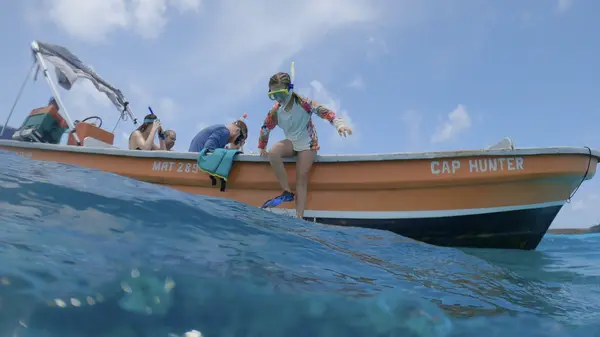
let's dive in
The captain has a crooked golden tooth, thick glasses, a hat, and a face that shows years and years passed at sea. Not an easy life for sure.
We shake hands and the four of us climb onboard a 6-meter boat with a single engine, where his helper, a younger guy with a big smile, has already set up some life jackets for the kids and fins for us.
We're going snorkeling on a nearby reef.
The trip is quite short, 10 minutes max, and we go around a big vessel that a big hurricane had smashed on the reef like 3 years before. The captain tells us a story about tugboats trying to pull it out and sinking too, so the vessel stays on the horizon on the windy side of the island, with an army officer on top who waves at us when we're passing nearby while holding a rifle. Seems it's his way to patrol for spearfishing and poaching lobster on the reef, which is illegal.
Our helper/snorkel guide with the big smile gives us the fins. We try to communicate but I figure out quite quickly he's not verbal.
Which in all honesty is not a problem... especially underwater. He actually guides the captain where to stop, where to dive, and where the current will push us.
We do three dives and he's of course well experienced. He tickles a stingray laying on the sand from the back to show us how they swim, he shows us a couple of nurse sharks and amazing beautiful coral.
Nice dives, while also pulling kids in and out of the water as they're not able to handle 2H full swimming... still, nice dives.
The day after, it's just me and my daughter going snorkelling, but we're not fully alone as 4 other tourists are joining us.
We go in the water and one of them seems to be struggling with the mask. He asks for another mask... he tries the new mask but he's struggling... he can't breathe. I start to wonder if he knows how snorkelling works (I know... it's very complicated, you breathe and that's it, but who knows...). Then he ends up struggling to get a life jacket, and after 15 minutes floating around we finally start our snorkel tour.
But they're quite slow. Our guide is trying to point the direction where to swim, but they float like driftwood. We move slowly. I'm eager to explore and these foreigner pieces of driftwood are floating around. And our guide... well, he's not verbal, so he gestures them to move, to keep going, but they're just floating with their heads out and having a chat, so they cannot see him underwater.
At that I snap: "Hey, stop talking and MOVE!!!!" I shout at them, and finally they get the gist. And these foreign pieces of driftwood start to kick their feet so we can chase small sharks and millions of colourful fish.
We shake hands and the four of us climb onboard a 6-meter boat with a single engine, where his helper, a younger guy with a big smile, has already set up some life jackets for the kids and fins for us.
We're going snorkeling on a nearby reef.
The trip is quite short, 10 minutes max, and we go around a big vessel that a big hurricane had smashed on the reef like 3 years before. The captain tells us a story about tugboats trying to pull it out and sinking too, so the vessel stays on the horizon on the windy side of the island, with an army officer on top who waves at us when we're passing nearby while holding a rifle. Seems it's his way to patrol for spearfishing and poaching lobster on the reef, which is illegal.
Our helper/snorkel guide with the big smile gives us the fins. We try to communicate but I figure out quite quickly he's not verbal.
Which in all honesty is not a problem... especially underwater. He actually guides the captain where to stop, where to dive, and where the current will push us.
We do three dives and he's of course well experienced. He tickles a stingray laying on the sand from the back to show us how they swim, he shows us a couple of nurse sharks and amazing beautiful coral.
Nice dives, while also pulling kids in and out of the water as they're not able to handle 2H full swimming... still, nice dives.
The day after, it's just me and my daughter going snorkelling, but we're not fully alone as 4 other tourists are joining us.
We go in the water and one of them seems to be struggling with the mask. He asks for another mask... he tries the new mask but he's struggling... he can't breathe. I start to wonder if he knows how snorkelling works (I know... it's very complicated, you breathe and that's it, but who knows...). Then he ends up struggling to get a life jacket, and after 15 minutes floating around we finally start our snorkel tour.
But they're quite slow. Our guide is trying to point the direction where to swim, but they float like driftwood. We move slowly. I'm eager to explore and these foreigner pieces of driftwood are floating around. And our guide... well, he's not verbal, so he gestures them to move, to keep going, but they're just floating with their heads out and having a chat, so they cannot see him underwater.
At that I snap: "Hey, stop talking and MOVE!!!!" I shout at them, and finally they get the gist. And these foreign pieces of driftwood start to kick their feet so we can chase small sharks and millions of colourful fish.
Carlito's way
7 July 2025
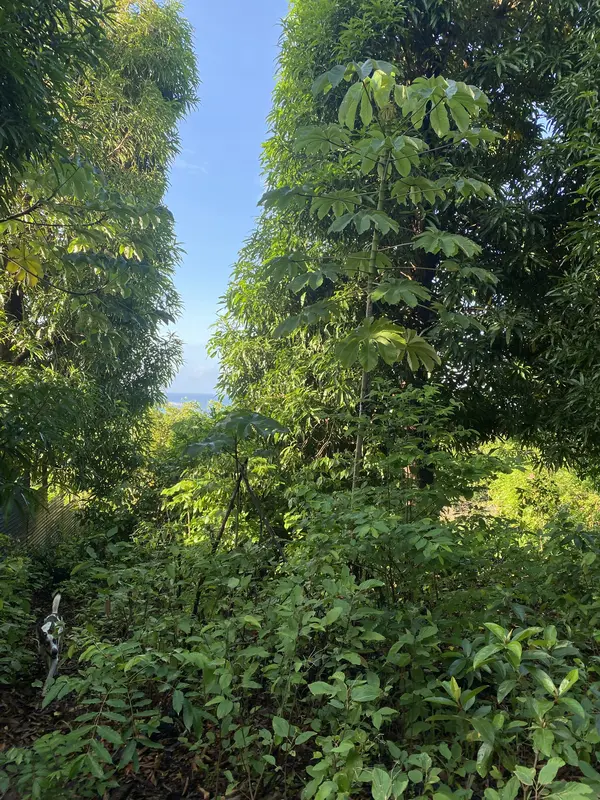
Carlito
There are a lot of roaming dogs on the island—some with an owner, some without. Little Corn Island has 1000 people living on it, which means everybody knows each other... and I bet all the dogs know each other too.
So when we ask at our stay who owns the dog that happens to follow us along, they say that's Carlito's dog, Carlito being some cabins along our beach strip.
Good name, so we start to call the dog Carlito.
The next day I wake up, I open the door of our bungalow, and Carlito is there. He roams around us while we have breakfast, and when we go to find a small beach on the other side of the island, he actually follows us through, waits for us 2 hours by the beach while we snorkel and collect shells, and walks with us on the way back.
The next morning I wake up at 5:30 to roam around the island and take some photos. Carlito is there and guess what? Follows me along the path to the center of the island. People are starting to wake up, I'm taking pictures of houses mostly as they're very characteristic and very rustic—some very Caribbean and colorful. Some people spot me and look at me badly, and I feel the usual shame of a tourist taking pictures of people's houses.
Anyway, I had noticed on one of our previous walks a place called the Lighthouse, and I had hoped to see the island from above. Well... the Lighthouse is a hotel, closed, so when I reach it I'm a bit disappointed. Carlito I feel is also disappointed, but there's a small trail on the side of the property, so I follow it—dead leaves and a narrow muddy path. And I start to think about boas. There are boas on the island, several boas... who hide... in the vegetation. I mean I know they mostly stay in the swamps... but still... I'm alone on a narrow muddy trail and there could be boas around..boas..those big snakes..boas..
But hey... I'm not alone. Carlito is with me, checking the path while I get lost in the vegetation and I finally manage to get a glimpse of the sea from above. So I follow Carlito... I follow Carlito's way.
So when we ask at our stay who owns the dog that happens to follow us along, they say that's Carlito's dog, Carlito being some cabins along our beach strip.
Good name, so we start to call the dog Carlito.
The next day I wake up, I open the door of our bungalow, and Carlito is there. He roams around us while we have breakfast, and when we go to find a small beach on the other side of the island, he actually follows us through, waits for us 2 hours by the beach while we snorkel and collect shells, and walks with us on the way back.
The next morning I wake up at 5:30 to roam around the island and take some photos. Carlito is there and guess what? Follows me along the path to the center of the island. People are starting to wake up, I'm taking pictures of houses mostly as they're very characteristic and very rustic—some very Caribbean and colorful. Some people spot me and look at me badly, and I feel the usual shame of a tourist taking pictures of people's houses.
Anyway, I had noticed on one of our previous walks a place called the Lighthouse, and I had hoped to see the island from above. Well... the Lighthouse is a hotel, closed, so when I reach it I'm a bit disappointed. Carlito I feel is also disappointed, but there's a small trail on the side of the property, so I follow it—dead leaves and a narrow muddy path. And I start to think about boas. There are boas on the island, several boas... who hide... in the vegetation. I mean I know they mostly stay in the swamps... but still... I'm alone on a narrow muddy trail and there could be boas around..boas..those big snakes..boas..
But hey... I'm not alone. Carlito is with me, checking the path while I get lost in the vegetation and I finally manage to get a glimpse of the sea from above. So I follow Carlito... I follow Carlito's way.
¡Buenos días!
8 July 2025
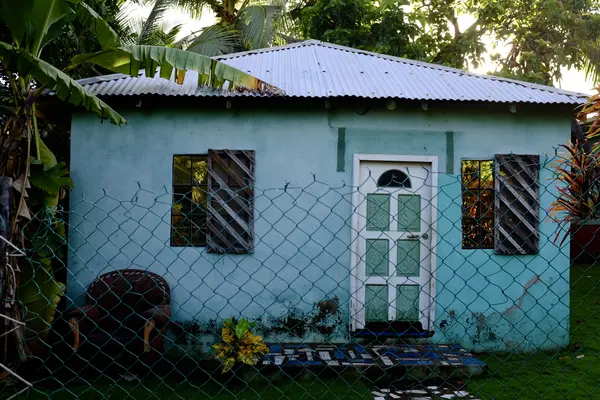
house with a sofa
The Corn Islands are two incredibly beautiful islands on the Caribbean side of Nicaragua, and they have that unmistakable Caribbean vibe—colorful houses painted in every shade imaginable, palm trees and mango trees everywhere. We constantly pick up loads of mangoes while walking the trails, so we're basically living on free, fresh, sweet fruit all the time.
The people here are completely different from the rest of Nicaragua. Some come from Nicaragua's Caribbean coast—they have darker skin than those from the inland and speak Spanish. Others have very dark skin, and some have dark skin with striking blue eyes. We feel like we're in Jamaica, and in fact, most of their ancestors actually came from there... as did their language.
They speak a mix of English Creole peppered with Spanish words, and honestly, I can't understand almost anything, even though it's supposedly based on English.
People are incredibly friendly. Most greet you while sitting on their porches (which seems to be one of the main activities here—island life at its finest), while others look at you seriously until you smile and greet them first. Then they break into smiles too.
Well... about greeting them. This is the tricky part.
Me: "Hello!"
Islander #1: "¡Hola!"
Me: "¡Buenos días!"
Islander #2: "Good morning!"
Me: "Good morning!"
Islander #3: "¡Hola!"
Me: "¡Hola!"
Islander #4: "Good morning!"
Even when I try to squeeze my brain and figure out whether I should address them in English or Spanish... there's not a chance I can get it right.
I know what I should have done. I should have just said: "Ciao!"
The people here are completely different from the rest of Nicaragua. Some come from Nicaragua's Caribbean coast—they have darker skin than those from the inland and speak Spanish. Others have very dark skin, and some have dark skin with striking blue eyes. We feel like we're in Jamaica, and in fact, most of their ancestors actually came from there... as did their language.
They speak a mix of English Creole peppered with Spanish words, and honestly, I can't understand almost anything, even though it's supposedly based on English.
People are incredibly friendly. Most greet you while sitting on their porches (which seems to be one of the main activities here—island life at its finest), while others look at you seriously until you smile and greet them first. Then they break into smiles too.
Well... about greeting them. This is the tricky part.
Me: "Hello!"
Islander #1: "¡Hola!"
Me: "¡Buenos días!"
Islander #2: "Good morning!"
Me: "Good morning!"
Islander #3: "¡Hola!"
Me: "¡Hola!"
Islander #4: "Good morning!"
Even when I try to squeeze my brain and figure out whether I should address them in English or Spanish... there's not a chance I can get it right.
I know what I should have done. I should have just said: "Ciao!"
Crab
10 July 2025
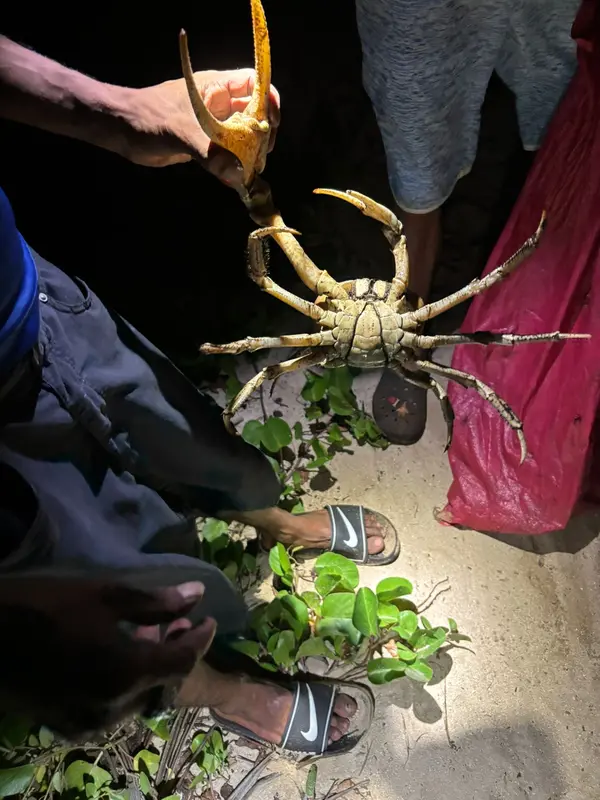
Crap that's a crab!
It's our last night on Little Corn Island. After a fishy meal by the beach (fishy as based of fish), we make our way home in darkness—after many days here, we know the path between coconut palms and beach huts by heart.
We grab a torch once we're home and start roaming around looking for the big crabs we've spotted on the paths before. These are massive guys with bodies like 10cm-diameter balls—they look like boxer crabs. When Carlito spots one and starts playing with it, the crab moves like Ali, ready to throw punches at his face.
So we're hunting for big crabs when we see another light coming from the inner part of the island. But strangely, this light isn't coming from any known path—it's coming straight from the inland swamp, where two guys emerge dragging a big rucksack.
I stop them and ask what they've caught. And guess what? Crabs! Loads of them—a huge bag full of crabs, still very much alive.
One of them tells me they go out when the sun goes down. Then he shows me his handmade bow with a 30cm metal arrow. "Yeah, I don't like to take them with my hands or whack them," he explains. "They're too fast and run like crazy through the swamp." (Where there are boas, I keep thinking to myself.) "So I shoot them with an arrow...easy job."
Easy job for him, maybe. I'd be terrified just entering that swamp at night. If a boa didn't kill me, the mosquitoes definitely would!
And that was me, talking about hunting crabs (with a torch), while they hunt them for real...
We grab a torch once we're home and start roaming around looking for the big crabs we've spotted on the paths before. These are massive guys with bodies like 10cm-diameter balls—they look like boxer crabs. When Carlito spots one and starts playing with it, the crab moves like Ali, ready to throw punches at his face.
So we're hunting for big crabs when we see another light coming from the inner part of the island. But strangely, this light isn't coming from any known path—it's coming straight from the inland swamp, where two guys emerge dragging a big rucksack.
I stop them and ask what they've caught. And guess what? Crabs! Loads of them—a huge bag full of crabs, still very much alive.
One of them tells me they go out when the sun goes down. Then he shows me his handmade bow with a 30cm metal arrow. "Yeah, I don't like to take them with my hands or whack them," he explains. "They're too fast and run like crazy through the swamp." (Where there are boas, I keep thinking to myself.) "So I shoot them with an arrow...easy job."
Easy job for him, maybe. I'd be terrified just entering that swamp at night. If a boa didn't kill me, the mosquitoes definitely would!
And that was me, talking about hunting crabs (with a torch), while they hunt them for real...
Flying backpacks
11 July 2025
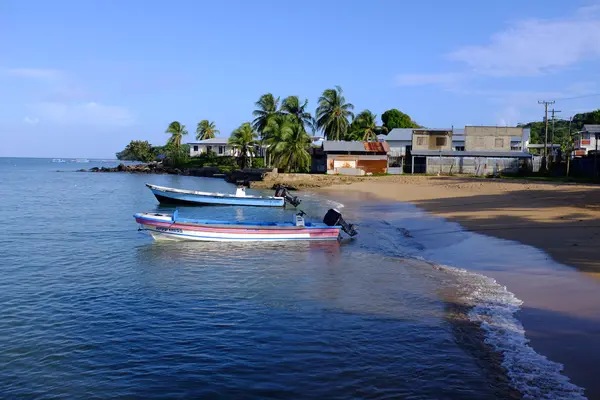
quiet at the port
It's our last morning on Little Corn Island.
Carlitos (the dog who's followed us around for days) is waiting on our porch and jumps all over me when I open the bungalow door. I take a last glimpse of the windy sea in the first light of dawn.
This is our most posh accommodation of the entire trip, so we're lucky to have a porter with a wheelbarrow to carry our luggage to the pier—a 15-minute walk to the other side of the island.
We chat along the way, and he tells me his story. He arrived here 40 years ago, escaping from war in Nueva Guinea. Here's where my ignorance shows: I immediately think Papua New Guinea, so I ask him how long the journey took. When he tells me it's 6 hours from home, I start to realize I'm pretty ignorant—first about the fact that there's a town in Nicaragua called Nueva Guinea, and second that I had no clue about any war in Nicaragua... or Papua, for that matter.
He's a nice man, and we chat our way to the pier, where we wait an hour for the boat to leave.
Since we got completely soaked by waves on the way over, I'd wisely sealed all my electronic gear in IKEA bags. I carry one smaller backpack with all the most important stuff—camera, laptop, passports, Kindle, tablet—but when the captain offers to store it in the dry storeroom, I think, "Why not? It's safer."
This trip isn't wet at all. They've put up a cover and we're going with the swell, so no splashes.
We dock at Big Island, everyone comes ashore, and the boat driver and his helper start passing bags between each other—helper on the boat, driver on the dock. Boxes go flying, our main backpacks go flying too, caught perfectly by the boat driver who passes them to me.
Then, exactly when the boat starts drifting a meter off the pier (loosely anchored), the helper grabs my most important, crucial money-passport-laptop smaller backpack and throws it to the driver.
I'd smartly put a rain cover on it. Very smartly... so smartly that when the boat driver leans out from the pier to catch it, he grabs just that.
My backpack starts sliding off the rain cover and begins falling toward the water. I lean out desperately, manage to grab one strap, and slam it onto the dock.
My heart is pounding. I can see myself jumping into the water to save my backpack before the IKEA bags fail and salt water corrodes my passport and ruins the rest of our holiday.
But I'm safe... everything's good... and off we go to catch our plane from Big Island, with my heart still racing.
Carlitos (the dog who's followed us around for days) is waiting on our porch and jumps all over me when I open the bungalow door. I take a last glimpse of the windy sea in the first light of dawn.
This is our most posh accommodation of the entire trip, so we're lucky to have a porter with a wheelbarrow to carry our luggage to the pier—a 15-minute walk to the other side of the island.
We chat along the way, and he tells me his story. He arrived here 40 years ago, escaping from war in Nueva Guinea. Here's where my ignorance shows: I immediately think Papua New Guinea, so I ask him how long the journey took. When he tells me it's 6 hours from home, I start to realize I'm pretty ignorant—first about the fact that there's a town in Nicaragua called Nueva Guinea, and second that I had no clue about any war in Nicaragua... or Papua, for that matter.
He's a nice man, and we chat our way to the pier, where we wait an hour for the boat to leave.
Since we got completely soaked by waves on the way over, I'd wisely sealed all my electronic gear in IKEA bags. I carry one smaller backpack with all the most important stuff—camera, laptop, passports, Kindle, tablet—but when the captain offers to store it in the dry storeroom, I think, "Why not? It's safer."
This trip isn't wet at all. They've put up a cover and we're going with the swell, so no splashes.
We dock at Big Island, everyone comes ashore, and the boat driver and his helper start passing bags between each other—helper on the boat, driver on the dock. Boxes go flying, our main backpacks go flying too, caught perfectly by the boat driver who passes them to me.
Then, exactly when the boat starts drifting a meter off the pier (loosely anchored), the helper grabs my most important, crucial money-passport-laptop smaller backpack and throws it to the driver.
I'd smartly put a rain cover on it. Very smartly... so smartly that when the boat driver leans out from the pier to catch it, he grabs just that.
My backpack starts sliding off the rain cover and begins falling toward the water. I lean out desperately, manage to grab one strap, and slam it onto the dock.
My heart is pounding. I can see myself jumping into the water to save my backpack before the IKEA bags fail and salt water corrodes my passport and ruins the rest of our holiday.
But I'm safe... everything's good... and off we go to catch our plane from Big Island, with my heart still racing.
Adelante
11 July 2025
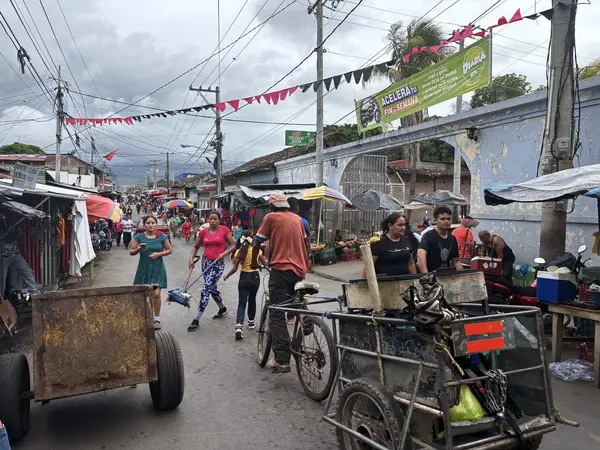
same market by day it's a different thing
After a smooth landing in Managua from Corn Island, we hop on local buses to Granada. The kids still aren't complaining after four hours of this—I'm still puzzled how they can handle it. After that, we spend the entire afternoon and evening walking through Granada, wandering through this beautiful colonial city with its old churches and amazingly colorful streets and houses.
The buildings look truly stunning, each painted in different vibrant colors. We stroll through the open plaza and down the touristy Calle where all the bars and restaurants are clustered. When night falls and the kids start looking as devastated as we feel after our walk/boat/plane/bus/bus/walk day, we decide it's time to head back to the hotel.
And as soon as we get back (I can't wait to lie down), I have to go out again.
Since we have a kitchen in the hotel, I need to forage for breakfast: some milk, cereal if I'm lucky (not really lucky to find them, but lucky not to hear my son complaining about eating eggs again every morning), some bread, fruit, and most importantly, eggs, of course.
So I'm walking again. We're staying just 5-10 minutes from the main town center, and I remember seeing some pulperías (local shops) around.
I manage to find cereal first, strangely enough, but pulperías often have no fruit and vegetables, so I walk further toward the main market. My memory serves me well, and after 5 minutes I'm walking down the main market street, which this afternoon was bustling with people and small shops and street stalls... but not now.
All the street lamps are not really working. It's quite dark on this street.
Apart from light coming from way down at the end of the road where a few lamps are still working, most of the street is dark, lined with empty, shadowy stalls and small alleys branching off from both sides of half-broken, one-story buildings.
Every 100 meters or so, there's a stall still open, mostly women selling vegetables.
I stop at the first one and buy some tomatoes (totally scammed—ugly ones—but it's dark, so I can't really inspect them). I ask if they have eggs. The woman replies: "Adelante," pointing further down the road, which is, of course, even darker.
So I walk further (adelante means "further ahead" in Spanish) and find another small stall with two women selling fruit and vegetables, their faces lit only by their phone screens. I ask for eggs but get told: "Adelante." I buy some avocados and get half-scammed again, realizing back at the hotel that they're so ripe I could probably drink them.
I continue walking down this pretty dark road with its shadowy alleys and closed stalls when I reach the third open stall... and, predictably: "Adelante!"
This is when I realize I've made a pretty significant mistake. I have all my money with me in my pouch. Smart. Very smart. Not ideal when you're walking alone in the dark, getting further from the city center.
But eggs are eggs. Without eggs, there's no breakfast. So I keep walking until finally I see another woman, her face illuminated by her phone, which at this point looks to me like an angel with divine light shining upon her. When she tells me she has eggs, I swear I hear celestial music all around me as I finally buy my precious eggs.
I dare to ask: "Do you have any mangoes by any chance?"
"Adelante!"
The buildings look truly stunning, each painted in different vibrant colors. We stroll through the open plaza and down the touristy Calle where all the bars and restaurants are clustered. When night falls and the kids start looking as devastated as we feel after our walk/boat/plane/bus/bus/walk day, we decide it's time to head back to the hotel.
And as soon as we get back (I can't wait to lie down), I have to go out again.
Since we have a kitchen in the hotel, I need to forage for breakfast: some milk, cereal if I'm lucky (not really lucky to find them, but lucky not to hear my son complaining about eating eggs again every morning), some bread, fruit, and most importantly, eggs, of course.
So I'm walking again. We're staying just 5-10 minutes from the main town center, and I remember seeing some pulperías (local shops) around.
I manage to find cereal first, strangely enough, but pulperías often have no fruit and vegetables, so I walk further toward the main market. My memory serves me well, and after 5 minutes I'm walking down the main market street, which this afternoon was bustling with people and small shops and street stalls... but not now.
All the street lamps are not really working. It's quite dark on this street.
Apart from light coming from way down at the end of the road where a few lamps are still working, most of the street is dark, lined with empty, shadowy stalls and small alleys branching off from both sides of half-broken, one-story buildings.
Every 100 meters or so, there's a stall still open, mostly women selling vegetables.
I stop at the first one and buy some tomatoes (totally scammed—ugly ones—but it's dark, so I can't really inspect them). I ask if they have eggs. The woman replies: "Adelante," pointing further down the road, which is, of course, even darker.
So I walk further (adelante means "further ahead" in Spanish) and find another small stall with two women selling fruit and vegetables, their faces lit only by their phone screens. I ask for eggs but get told: "Adelante." I buy some avocados and get half-scammed again, realizing back at the hotel that they're so ripe I could probably drink them.
I continue walking down this pretty dark road with its shadowy alleys and closed stalls when I reach the third open stall... and, predictably: "Adelante!"
This is when I realize I've made a pretty significant mistake. I have all my money with me in my pouch. Smart. Very smart. Not ideal when you're walking alone in the dark, getting further from the city center.
But eggs are eggs. Without eggs, there's no breakfast. So I keep walking until finally I see another woman, her face illuminated by her phone, which at this point looks to me like an angel with divine light shining upon her. When she tells me she has eggs, I swear I hear celestial music all around me as I finally buy my precious eggs.
I dare to ask: "Do you have any mangoes by any chance?"
"Adelante!"
Fumarola
12 July 2025
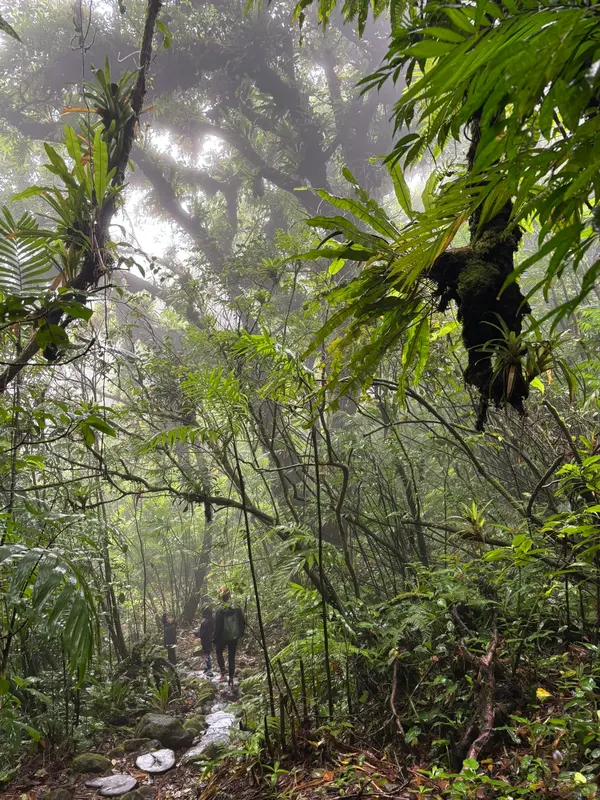
wet wet wet
One of the main things to do in Granada is hiking Mombacho Volcano.
"The floor is lava!" becomes the kids' motto for the hike, even though you can't actually see any lava (we had kids signed a waiver where they accepted to see no lava before hiking).
We catch a taxi to the park entrance, where rangers transport you up to 1,300 meters in 4x4 pickups carrying an average of 20 people each trip. We're crammed in the back seat—six of us plus all the other passengers squeezed into the open truck bed.
There are several hikes available: one easy trail around the volcano's rim, and three longer ones requiring a guide. Because we're feeling very adventurous, we decide to take the easy one.
Just an hour to an hour and a half through the cloud forest, where you can see lots of... clouds.
This is one of only two cloud forests in Nicaragua—tropical forests that, thanks to specific conditions like having a massive volcano, grow at higher altitudes than normal tropical forests.
We have our rain jackets ready because it's incredibly wet. Not even rain exactly, just wind and water constantly dripping from millions of different plants and trees. We find one tree where many other plants are growing right on top of it, with a sign stating there are more plant varieties on this single tree than there are tree species in an entire English or Swedish forest. That's why walking through forests in Ireland sometimes feels boring by comparison.
Between the strong wind and drizzle, it's so cloudy that the first three viewpoints are actually view-only-clouds-points. No chance to see inside the rim or the valley below.
We reach a viewpoint facing the valley below rather than the inner crater. Here we can see the terrain sloping down to the valley—it's extremely windy since we're not protected by the inner rim, so we decide to stop for a break.
I give the kids some boiled eggs, and my daughter immediately starts complaining about the smell. "They really stink!" But it's pretty windy—how can she smell anything? So I argue with her, but then my wife smells the eggs too. How can you smell boiled eggs in 40 km/h wind?
Because they smell like the belly of a volcano!
We're standing right next to a fumarole—there's a fence overlooking a crack in the ground where hot air streams out straight from the volcano. We enjoy our eggs alongside some genuine volcanic stink.
The floor really is lava! (Almost.)
"The floor is lava!" becomes the kids' motto for the hike, even though you can't actually see any lava (we had kids signed a waiver where they accepted to see no lava before hiking).
We catch a taxi to the park entrance, where rangers transport you up to 1,300 meters in 4x4 pickups carrying an average of 20 people each trip. We're crammed in the back seat—six of us plus all the other passengers squeezed into the open truck bed.
There are several hikes available: one easy trail around the volcano's rim, and three longer ones requiring a guide. Because we're feeling very adventurous, we decide to take the easy one.
Just an hour to an hour and a half through the cloud forest, where you can see lots of... clouds.
This is one of only two cloud forests in Nicaragua—tropical forests that, thanks to specific conditions like having a massive volcano, grow at higher altitudes than normal tropical forests.
We have our rain jackets ready because it's incredibly wet. Not even rain exactly, just wind and water constantly dripping from millions of different plants and trees. We find one tree where many other plants are growing right on top of it, with a sign stating there are more plant varieties on this single tree than there are tree species in an entire English or Swedish forest. That's why walking through forests in Ireland sometimes feels boring by comparison.
Between the strong wind and drizzle, it's so cloudy that the first three viewpoints are actually view-only-clouds-points. No chance to see inside the rim or the valley below.
We reach a viewpoint facing the valley below rather than the inner crater. Here we can see the terrain sloping down to the valley—it's extremely windy since we're not protected by the inner rim, so we decide to stop for a break.
I give the kids some boiled eggs, and my daughter immediately starts complaining about the smell. "They really stink!" But it's pretty windy—how can she smell anything? So I argue with her, but then my wife smells the eggs too. How can you smell boiled eggs in 40 km/h wind?
Because they smell like the belly of a volcano!
We're standing right next to a fumarole—there's a fence overlooking a crack in the ground where hot air streams out straight from the volcano. We enjoy our eggs alongside some genuine volcanic stink.
The floor really is lava! (Almost.)
Differences
13 July 2025
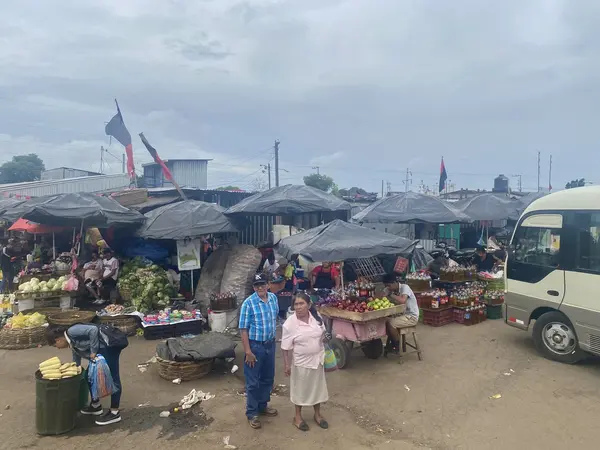
Masaya terminal
Next to Granada sits another city called Masaya—a big commercial hub. The bus from Granada drops us near the main market for a morning trip.
It's Sunday and it's incredibly busy, bustling with people, noises, and smells.
My daughter: "Daddy..."
"Yes?"
"In Ireland, fruit is not sold pre-cut on street corners."
"In Ireland, mangoes are not this good."
"In Ireland, fruit is sold in Aldi or Lidl, not on street corners."
"In Ireland, juices are not sold on street corners (yes, everything is sold on street corners here), stored in big plastic jars, and sold in small transparent plastic bags that you chew just enough to make a hole and drink from."
"In Ireland, taxis don't honk at you constantly."
"In Ireland, shops don't have massive speakers on the front sidewalk blasting music so loud you need to cover your ears when you walk past."
"In Ireland, they don't have three-wheeler taxis."
"In Ireland, farmers don't cross the city with horses and old wooden carts to move goods."
"In Ireland, women don't carry massive baskets on their heads selling pastries and baked goods."
"In Ireland, you don't see live chickens wandering around town."
"In Ireland, in clothing shops, the clothes are inside, not hanging outside."
"In Ireland, buses are not this colorful."
"In Ireland, people don't walk around selling just one thing, like this guy selling only one type of chewing gum from a small paper box—that's it."
"In Nicaragua..."
It's Sunday and it's incredibly busy, bustling with people, noises, and smells.
My daughter: "Daddy..."
"Yes?"
"In Ireland, fruit is not sold pre-cut on street corners."
"In Ireland, mangoes are not this good."
"In Ireland, fruit is sold in Aldi or Lidl, not on street corners."
"In Ireland, juices are not sold on street corners (yes, everything is sold on street corners here), stored in big plastic jars, and sold in small transparent plastic bags that you chew just enough to make a hole and drink from."
"In Ireland, taxis don't honk at you constantly."
"In Ireland, shops don't have massive speakers on the front sidewalk blasting music so loud you need to cover your ears when you walk past."
"In Ireland, they don't have three-wheeler taxis."
"In Ireland, farmers don't cross the city with horses and old wooden carts to move goods."
"In Ireland, women don't carry massive baskets on their heads selling pastries and baked goods."
"In Ireland, you don't see live chickens wandering around town."
"In Ireland, in clothing shops, the clothes are inside, not hanging outside."
"In Ireland, buses are not this colorful."
"In Ireland, people don't walk around selling just one thing, like this guy selling only one type of chewing gum from a small paper box—that's it."
"In Nicaragua..."
Portuaria
14 July 2025
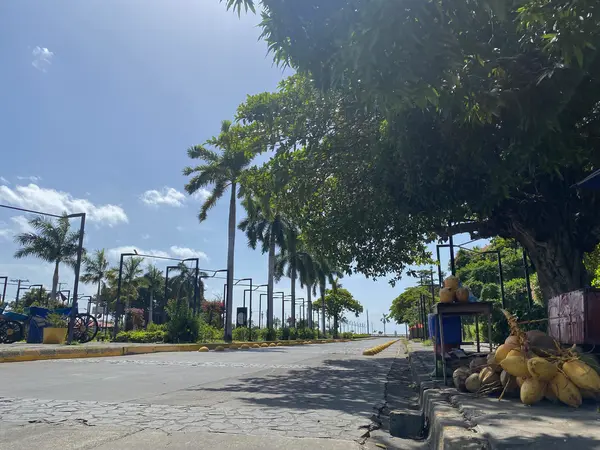
hot sunny coconuts
We've been told that the bus from Granada to San Carlos stops at the Granada pier. The taxi driver confirms this, drives us near the single pier, and leaves us nearby where he's certain the bus will stop.
We were told to arrive at 9 AM to get tickets and ensure we have seats, even though the bus isn't supposed to leave until 11. The taxi drops us next to a woman with two green parrots selling coconuts and Coca-Cola... and it's just us and this woman for now.
She's completely chilled, sitting on a stool watching the few cars pass by. She rents chairs in the shade of the big tree she's sitting under, plus coconuts—not a bad business model. The kids go exploring with my wife the pier while I wait with our backpacks in the shade of the same tree.
After 30 minutes, people start arriving with cardboard boxes and big plastic bags, renting chairs and sipping colas. I begin wondering why they told us to come at 9 when it's just us and four other people, still more than an hour before the bus is supposed to depart.
An old, thin man with worn flip-flops approaches on his bike, wearing jeans, a blue t-shirt, an orange and black hat, and sporting a weathered face. He's balancing a 5-liter coffee thermos on one handlebar and a white plastic bag with cups and fresh bread on the other. Again, not a bad business model—everyone gets coffee and a roll, even the coconut woman. I wonder how long he's been cycling around this town, distributing coffee and chatting away what's probably his entire day.
More people continue arriving—15 of us in total when the bus finally shows up. Bags, luggage, and cardboard boxes get loaded into the bottom compartment. We're lucky this is an express service, so you pay a bit more, but at least I don't have to sit with all my backpacks between my legs for the entire 6-hour journey.
As I approach the bus to stow my big backpacks underneath, I notice there's a 15-year-old kid under the vehicle, tinkering with mechanical parts, hammering at something with his hands on a box that appears to access the engine. After a few good punches, some inner compartment opens. I'll admit my ignorance about bus engines, but he works with an Allen key for a few minutes, then pulls out some mechanical part and starts discussing it with the bus driver.
I board the bus and can see they're still talking and tinkering with this component.
From my previous travels, I'm convinced that if he managed to pull it out, he'll be able to put it back in again. And after 2 hours of waiting at Granada's port, the bus finally leaves.
We were told to arrive at 9 AM to get tickets and ensure we have seats, even though the bus isn't supposed to leave until 11. The taxi drops us next to a woman with two green parrots selling coconuts and Coca-Cola... and it's just us and this woman for now.
She's completely chilled, sitting on a stool watching the few cars pass by. She rents chairs in the shade of the big tree she's sitting under, plus coconuts—not a bad business model. The kids go exploring with my wife the pier while I wait with our backpacks in the shade of the same tree.
After 30 minutes, people start arriving with cardboard boxes and big plastic bags, renting chairs and sipping colas. I begin wondering why they told us to come at 9 when it's just us and four other people, still more than an hour before the bus is supposed to depart.
An old, thin man with worn flip-flops approaches on his bike, wearing jeans, a blue t-shirt, an orange and black hat, and sporting a weathered face. He's balancing a 5-liter coffee thermos on one handlebar and a white plastic bag with cups and fresh bread on the other. Again, not a bad business model—everyone gets coffee and a roll, even the coconut woman. I wonder how long he's been cycling around this town, distributing coffee and chatting away what's probably his entire day.
More people continue arriving—15 of us in total when the bus finally shows up. Bags, luggage, and cardboard boxes get loaded into the bottom compartment. We're lucky this is an express service, so you pay a bit more, but at least I don't have to sit with all my backpacks between my legs for the entire 6-hour journey.
As I approach the bus to stow my big backpacks underneath, I notice there's a 15-year-old kid under the vehicle, tinkering with mechanical parts, hammering at something with his hands on a box that appears to access the engine. After a few good punches, some inner compartment opens. I'll admit my ignorance about bus engines, but he works with an Allen key for a few minutes, then pulls out some mechanical part and starts discussing it with the bus driver.
I board the bus and can see they're still talking and tinkering with this component.
From my previous travels, I'm convinced that if he managed to pull it out, he'll be able to put it back in again. And after 2 hours of waiting at Granada's port, the bus finally leaves.
Proverb
14 July 2025
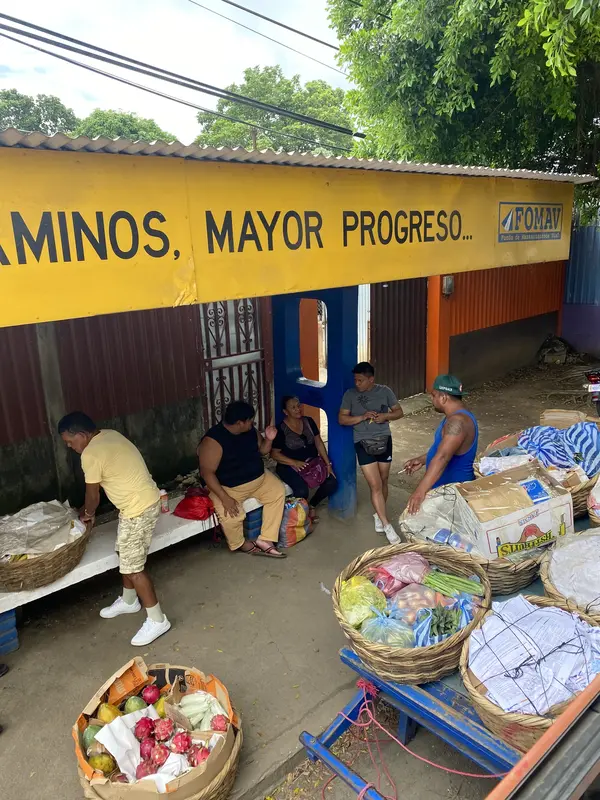
never throw an egg out when bus is loading goods
Who was born first? Chicken or egg? According to ChatGPT, first the... was born. Yeah, if it can figure it out, why should I?
Anyway, eggs are our safety food. Whenever we take a long bus trip and happen to have a kitchen in our accommodation, we boil 6-8 eggs so we can save money on a meal out and feed my kids something that isn't fried—which on the road is a rarity to find, other than chips and cookies.
So we boil eggs to share, and almost every time... the kids eat them all. We bring 6, they eat 6. We bring 8, they eat 8. For me and my wife? Nada.
No eggs. Or at least not the full egg. My daughter started some time back not eating the yolk for some strange reason—at least not on boiled eggs, while happily eating it fried (kids, or nowadays kids). Then my son, of course, started copying the same behavior. So me and my wife often end up eating all the yolks.
So here we are on a 6-hour bus journey from Granada to San Carlos with our boiled eggs. The kids are hungry and begging for snacks, so I crack the first one on the window sill, peel it, and give it to my son, who starts eating the white and, of course, hands me the yolk. By the third egg, I'm fed up with eating yolks, so I just throw it through the open window while we're cruising through the countryside.
The yellow, small, fat ball flies at 80 km/hour outside, hitting on the head a man cycling just as the bus overtakes him... adding half a yolk to his other brain cells. Oh, for yolk's sake!
Okay, I admit it... it didn't happen, but it could have. From this comes the famous proverb: "Better a yolk on the head than a chicken on the head."
Anyway, eggs are our safety food. Whenever we take a long bus trip and happen to have a kitchen in our accommodation, we boil 6-8 eggs so we can save money on a meal out and feed my kids something that isn't fried—which on the road is a rarity to find, other than chips and cookies.
So we boil eggs to share, and almost every time... the kids eat them all. We bring 6, they eat 6. We bring 8, they eat 8. For me and my wife? Nada.
No eggs. Or at least not the full egg. My daughter started some time back not eating the yolk for some strange reason—at least not on boiled eggs, while happily eating it fried (kids, or nowadays kids). Then my son, of course, started copying the same behavior. So me and my wife often end up eating all the yolks.
So here we are on a 6-hour bus journey from Granada to San Carlos with our boiled eggs. The kids are hungry and begging for snacks, so I crack the first one on the window sill, peel it, and give it to my son, who starts eating the white and, of course, hands me the yolk. By the third egg, I'm fed up with eating yolks, so I just throw it through the open window while we're cruising through the countryside.
The yellow, small, fat ball flies at 80 km/hour outside, hitting on the head a man cycling just as the bus overtakes him... adding half a yolk to his other brain cells. Oh, for yolk's sake!
Okay, I admit it... it didn't happen, but it could have. From this comes the famous proverb: "Better a yolk on the head than a chicken on the head."
Rough
14 July 2025
We arrive in San Carlos after 7 hours on the bus (plus 2 hours waiting for it on the sidewalk) with some preconceptions already forming.
We'd been told by other travelers heading to the same area that it wasn't a nice place, but we always wonder—their perception and expectations could be different. Come on, it can't be that bad, right?
During the bus journey, we'd noticed a change in the houses. Approaching the town, the buildings were poorer than in the first few hours of travel. Some walls built with bricks but mostly not plastered—just bare bricks, and sometimes half of those replaced with wooden planks. Typical outside toilets: tin boxes with tin roofs standing outside the houses.
San Carlos is the end of the road. After that, you can only take boats to reach remote region on the border with Costarica, hence an area for smuggling of all kind.
And we are taking a boat to Los Guatuzos, some wildlife refuge to spot wild animals and some tropical jungle experience.
Our bus arrives and (luckily for us) our host is waiting there. She's a nicely dressed woman wearing long brown trousers, a floral shirt, and a fedora hat—in stark contrast to everything around her.
The faces at the bus stop look a bit tougher. People seem sadder and less smiley compared to the many other bus stops we've encountered. It's also evening, which makes everything look darker.
There's a strong stench, and an open gutter runs along the inner sidewalk. Our host guides us, and there's a woman lying on her back on the ground, apparently having an epileptic seizure, while people simply step around her as they walk. Few drunks around. I keep the kids close and we walk briskly past.
We follow our host for 5 minutes to our accommodation for the night. Her house is built within a warehouse, using its walls and covered by a large tin roof, where hers and another house sit inside side by side. Only the ground floor is completed, with pillars and bare bricks and cement on top. Old photos hang around, and there's a lot of clutter old trinkets with look to have some sentimental attachment to the owner.
The room is damp and old, semi-clean, wiring out in some plugs, but considering we were told this was a good option for one night, we wonder what the other choices were like.
This is a busy route but not a very touristic one. Few tourists pass through here except to reach wildlife conservation centers, and mainly during peak season—not now.
Once we drop our backpacks, we ask for restaurant recommendations, and I'm already expecting the worst. Luckily for us, there's a woman frying food in front of her house, selling a cheap combo of fried plantains with some meat on top. We order two portions, served in blue plastic bags. She asks for 50 córdobas each, and I think, "Wow, that's cheap!" But when we open the bags, there's barely any meat.
I go back and ask to buy just the meat, but she replies, "I only sell this combo, with the chips." After some convincing, I manage to get two more small pieces of meat, and we gladly end our dinner like this, all tired and wrecked.
But I need to get water, and 2 beers—well deserved after such a trip.
And that's when it hits me. Everything is dark and gated. There are people lying on the floors of houses, people sprawled on sidewalks. I get 2 beers from an empty bar where music blares—it seems like a karaoke place where nobody wants to sing. The guy agrees to sell me 2 cans of beer but has no change, even for small bills.
I cross the road with him to a hospedaje—a local hostel—where lots of men sit on plastic chairs. Next to them, a big man sits half on the road in one of those same chairs, holding a thick roll in his hand, just staring at the street.
I get my change from him. Everybody looks at me—I'm easy to spot. In the darkness, I make my way back to our place.
Well... those people who told us it wasn't a nice place? I think they were right this time.
We'd been told by other travelers heading to the same area that it wasn't a nice place, but we always wonder—their perception and expectations could be different. Come on, it can't be that bad, right?
During the bus journey, we'd noticed a change in the houses. Approaching the town, the buildings were poorer than in the first few hours of travel. Some walls built with bricks but mostly not plastered—just bare bricks, and sometimes half of those replaced with wooden planks. Typical outside toilets: tin boxes with tin roofs standing outside the houses.
San Carlos is the end of the road. After that, you can only take boats to reach remote region on the border with Costarica, hence an area for smuggling of all kind.
And we are taking a boat to Los Guatuzos, some wildlife refuge to spot wild animals and some tropical jungle experience.
Our bus arrives and (luckily for us) our host is waiting there. She's a nicely dressed woman wearing long brown trousers, a floral shirt, and a fedora hat—in stark contrast to everything around her.
The faces at the bus stop look a bit tougher. People seem sadder and less smiley compared to the many other bus stops we've encountered. It's also evening, which makes everything look darker.
There's a strong stench, and an open gutter runs along the inner sidewalk. Our host guides us, and there's a woman lying on her back on the ground, apparently having an epileptic seizure, while people simply step around her as they walk. Few drunks around. I keep the kids close and we walk briskly past.
We follow our host for 5 minutes to our accommodation for the night. Her house is built within a warehouse, using its walls and covered by a large tin roof, where hers and another house sit inside side by side. Only the ground floor is completed, with pillars and bare bricks and cement on top. Old photos hang around, and there's a lot of clutter old trinkets with look to have some sentimental attachment to the owner.
The room is damp and old, semi-clean, wiring out in some plugs, but considering we were told this was a good option for one night, we wonder what the other choices were like.
This is a busy route but not a very touristic one. Few tourists pass through here except to reach wildlife conservation centers, and mainly during peak season—not now.
Once we drop our backpacks, we ask for restaurant recommendations, and I'm already expecting the worst. Luckily for us, there's a woman frying food in front of her house, selling a cheap combo of fried plantains with some meat on top. We order two portions, served in blue plastic bags. She asks for 50 córdobas each, and I think, "Wow, that's cheap!" But when we open the bags, there's barely any meat.
I go back and ask to buy just the meat, but she replies, "I only sell this combo, with the chips." After some convincing, I manage to get two more small pieces of meat, and we gladly end our dinner like this, all tired and wrecked.
But I need to get water, and 2 beers—well deserved after such a trip.
And that's when it hits me. Everything is dark and gated. There are people lying on the floors of houses, people sprawled on sidewalks. I get 2 beers from an empty bar where music blares—it seems like a karaoke place where nobody wants to sing. The guy agrees to sell me 2 cans of beer but has no change, even for small bills.
I cross the road with him to a hospedaje—a local hostel—where lots of men sit on plastic chairs. Next to them, a big man sits half on the road in one of those same chairs, holding a thick roll in his hand, just staring at the street.
I get my change from him. Everybody looks at me—I'm easy to spot. In the darkness, I make my way back to our place.
Well... those people who told us it wasn't a nice place? I think they were right this time.
Back home
15 July 2025
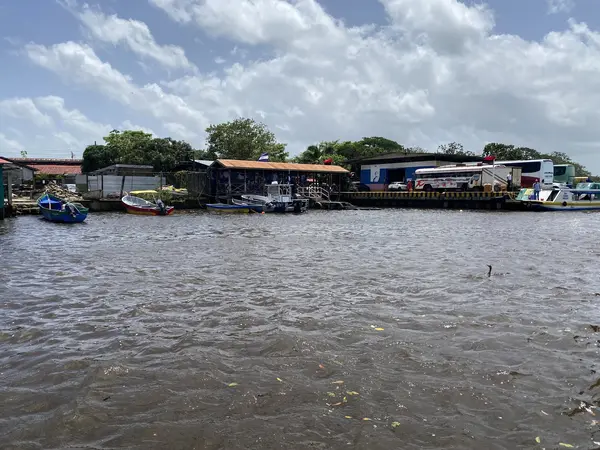
San Carlos port
"I wanna go back home."
"I wanna go back home."
"I wanna go back home."
We just woke up in San Carlos in the least posh accommodation we've stayed in so far. We're still exhausted from yesterday's all-day travel marathon. The room was sweltering and the beds were sticky, so it wasn't exactly a restful night—not to mention the mosquitoes we'll never get used to.
First crisis: Both kids wake up cranky, scratching themselves from bites and heat. My son is sneezing from what's probably an allergic reaction to the damp room and bedding.
Second crisis: They both want to watch cartoons, but we need breakfast, and luckily our host is preparing some for us. I'm hoping the kids will eat at least some scrambled eggs.
Third crisis: My son is begging for milk and cereal, but our host has no milk—and there's no chance I'm walking around this place trying to find some. We need to eat and get to the boat to secure our seats.
At this point, he's been crying for more than half an hour. My daughter can't stand him because he's loud, and she also woke up annoyed. The general irritation is skyrocketing.
We've been traveling for over three weeks now, and we're actually heading to the most hardcore location of our entire trip—so this isn't exactly a great start. We'll face heat and mosquitoes non-stop for the next two days, and we'll be in the middle of nowhere with barely a pulpería around. We try to explain this to him, but what can a 4-year-old understand about his crazy parents dragging him across Central America to see wild animals? Why should he care? He wants cartoons, milk, and cornflakes.
His tantrum reaches its peak with shouting and throwing himself on the floor.
"I wanna go back home."
"I wanna go back home."
"I wanna go back home where we live."
"Where we live." It's the first time he's said this since we started traveling.
Dude, we're heading to the farthest point we'll be from home—a 4-hour boat ride to a place reachable only by boat, where people go to illegally cross borders, poach animals, and dig for gold. Poor kid. He has no idea.
"I wanna go back home."
"I wanna go back home."
"I wanna go back home."
Slowly, my wife manages to calm him down, spoon-feeds him some eggs, we invent some stories... and the adventure continues.
"I wanna go back home."
"I wanna go back home."
We just woke up in San Carlos in the least posh accommodation we've stayed in so far. We're still exhausted from yesterday's all-day travel marathon. The room was sweltering and the beds were sticky, so it wasn't exactly a restful night—not to mention the mosquitoes we'll never get used to.
First crisis: Both kids wake up cranky, scratching themselves from bites and heat. My son is sneezing from what's probably an allergic reaction to the damp room and bedding.
Second crisis: They both want to watch cartoons, but we need breakfast, and luckily our host is preparing some for us. I'm hoping the kids will eat at least some scrambled eggs.
Third crisis: My son is begging for milk and cereal, but our host has no milk—and there's no chance I'm walking around this place trying to find some. We need to eat and get to the boat to secure our seats.
At this point, he's been crying for more than half an hour. My daughter can't stand him because he's loud, and she also woke up annoyed. The general irritation is skyrocketing.
We've been traveling for over three weeks now, and we're actually heading to the most hardcore location of our entire trip—so this isn't exactly a great start. We'll face heat and mosquitoes non-stop for the next two days, and we'll be in the middle of nowhere with barely a pulpería around. We try to explain this to him, but what can a 4-year-old understand about his crazy parents dragging him across Central America to see wild animals? Why should he care? He wants cartoons, milk, and cornflakes.
His tantrum reaches its peak with shouting and throwing himself on the floor.
"I wanna go back home."
"I wanna go back home."
"I wanna go back home where we live."
"Where we live." It's the first time he's said this since we started traveling.
Dude, we're heading to the farthest point we'll be from home—a 4-hour boat ride to a place reachable only by boat, where people go to illegally cross borders, poach animals, and dig for gold. Poor kid. He has no idea.
"I wanna go back home."
"I wanna go back home."
"I wanna go back home."
Slowly, my wife manages to calm him down, spoon-feeds him some eggs, we invent some stories... and the adventure continues.
The cure
15 July 2025
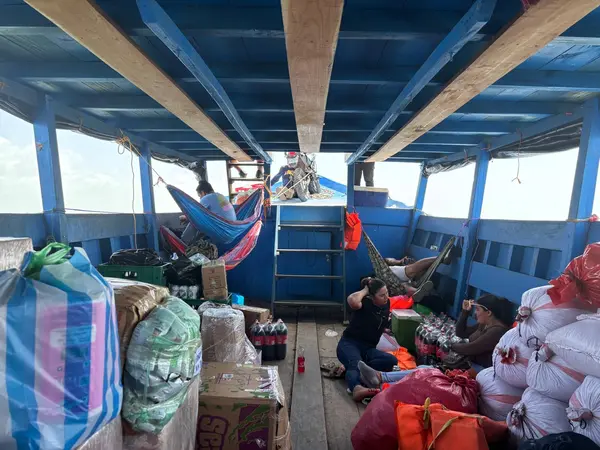
why not pull out an amaca and make the travel more comfy?
We're sitting in the boat bound for Los Guatuzos, waiting for it to leave while guarding our seats.
We're definitely the only foreigners in town, judging by the faces and how people look at us. I'm starting to understand why they might question our decision to travel here—not exactly a fun destination, just a port before some faraway land reachable via boat only, jungle and the border with Costa Rica.
This becomes even clearer after we board, when a policewoman arrives, takes our passports (only ours, since we're the sole tourists), checks them thoroughly, and takes pictures of them.
This confirms that not many foreigners pass through here, and whoever does is apparently tracked.
But hey, to spot wildlife you need to go wild.
The boat is a 20-meter wooden vessel with a deep hull and wooden roof, getting loaded with boxes of rice, food, and who knows what else. There are a few plastic chairs and some wooden benches, so people quickly claim the best spots (plastic wins).
Like on the bus, you don't have to go out looking for food—food always comes to you.
Sellers of every kind come aboard before the boat leaves, hawking juices, popcorn, batteries, amoxicillin pills—everything you might need for a comfortable journey to the outskirts of civilization.
A man dressed like a local cowboy—brown boots, jeans, big belt with an enormous golden buckle—enters the boat, plants his legs wide, and launches into a grand speech. He has a metal suitcase and pulls out small medicine bottles that can apparently cure everything. When I say everything, I mean literally everything.
For 15 minutes, he lists all the diseases this magnificent medicine can cure: skin diseases, leprosy, fungus, cuts, burns, skin cancers, cancers, sore throats, hemorrhoids, cancer again. Headaches? Of course. Sweaty armpits? Absolutely. Bad breath? Only if you have some other disease to pile on top.
A few people examine the sample bottles he distributes around. We're kind of lucky because the boat needs to depart, putting time pressure on potential buyers who hastily make their purchases. We're also lucky because I'm starting to lose count of all the diseases this medicine could supposedly cure.
And the boat leaves, with some of us fortunate enough to have met the cowboy healer.
We're definitely the only foreigners in town, judging by the faces and how people look at us. I'm starting to understand why they might question our decision to travel here—not exactly a fun destination, just a port before some faraway land reachable via boat only, jungle and the border with Costa Rica.
This becomes even clearer after we board, when a policewoman arrives, takes our passports (only ours, since we're the sole tourists), checks them thoroughly, and takes pictures of them.
This confirms that not many foreigners pass through here, and whoever does is apparently tracked.
But hey, to spot wildlife you need to go wild.
The boat is a 20-meter wooden vessel with a deep hull and wooden roof, getting loaded with boxes of rice, food, and who knows what else. There are a few plastic chairs and some wooden benches, so people quickly claim the best spots (plastic wins).
Like on the bus, you don't have to go out looking for food—food always comes to you.
Sellers of every kind come aboard before the boat leaves, hawking juices, popcorn, batteries, amoxicillin pills—everything you might need for a comfortable journey to the outskirts of civilization.
A man dressed like a local cowboy—brown boots, jeans, big belt with an enormous golden buckle—enters the boat, plants his legs wide, and launches into a grand speech. He has a metal suitcase and pulls out small medicine bottles that can apparently cure everything. When I say everything, I mean literally everything.
For 15 minutes, he lists all the diseases this magnificent medicine can cure: skin diseases, leprosy, fungus, cuts, burns, skin cancers, cancers, sore throats, hemorrhoids, cancer again. Headaches? Of course. Sweaty armpits? Absolutely. Bad breath? Only if you have some other disease to pile on top.
A few people examine the sample bottles he distributes around. We're kind of lucky because the boat needs to depart, putting time pressure on potential buyers who hastily make their purchases. We're also lucky because I'm starting to lose count of all the diseases this medicine could supposedly cure.
And the boat leaves, with some of us fortunate enough to have met the cowboy healer.
Arturo
15 July 2025
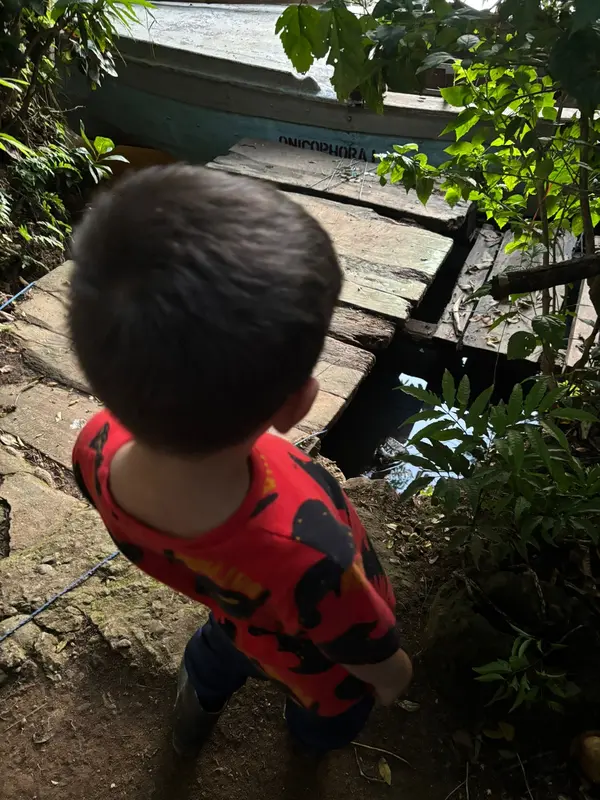
down below..Arturo's silohuette..
When the boat leaves Lake Cocibolca to head inland through the Papaturro River, it becomes like a National Geographic episode. The river is narrower than I expected. The kids and I go up to the upper deck to watch a myriad of birds flying around as the boat flows through water and plants. We hit branches and need to duck down when big palm leaves smack the top deck, to avoid being face-palmed by a palm. It really feels like an adventure now.
We dock in Papaturro—hot and sticky. We're staying in cabañas owned by a local family who also organize jungle tours. Our host picks us up and brings us to her place right next to the small dock and the river, where we'll have our meals and where her family lives. There are lots of wooden sculptures, wooden tables made from big tree sections, plants, and a small opening to the river where a few planks at water level form a tiny pier where their wooden lancha floats.
We're literally on the banks of a brown river from where we'll navigate and compete to see who spots more animals (my wife will win anyway, but we all play along).
The kids go exploring the water at this makeshift pier almost at water level, then come running back to us, excited.
"There's a crocodile!"
What? A croc? I can't believe it.
In fact, it's not a crocodile—it's a 2-meter-long caiman who happens to be part of the family living here. His head is just above water near the planks, and we can see it perfectly.
Our host tells us not to worry. Why should I, right? His name is Arturo, named after a joke connected to the word "hartar," which means eating a lot. And I shouldn't worry?
He lives right by the house in an underwater cave, and more often than not, he just bubbles up to poke his head out while my kids can't stop staring at him.
¡Mucho gusto, Arturo! ("Nice to meet you" in Spanish—I suppose he'd understand more Spanish than English.)
We dock in Papaturro—hot and sticky. We're staying in cabañas owned by a local family who also organize jungle tours. Our host picks us up and brings us to her place right next to the small dock and the river, where we'll have our meals and where her family lives. There are lots of wooden sculptures, wooden tables made from big tree sections, plants, and a small opening to the river where a few planks at water level form a tiny pier where their wooden lancha floats.
We're literally on the banks of a brown river from where we'll navigate and compete to see who spots more animals (my wife will win anyway, but we all play along).
The kids go exploring the water at this makeshift pier almost at water level, then come running back to us, excited.
"There's a crocodile!"
What? A croc? I can't believe it.
In fact, it's not a crocodile—it's a 2-meter-long caiman who happens to be part of the family living here. His head is just above water near the planks, and we can see it perfectly.
Our host tells us not to worry. Why should I, right? His name is Arturo, named after a joke connected to the word "hartar," which means eating a lot. And I shouldn't worry?
He lives right by the house in an underwater cave, and more often than not, he just bubbles up to poke his head out while my kids can't stop staring at him.
¡Mucho gusto, Arturo! ("Nice to meet you" in Spanish—I suppose he'd understand more Spanish than English.)
Pirates
15 July 2025
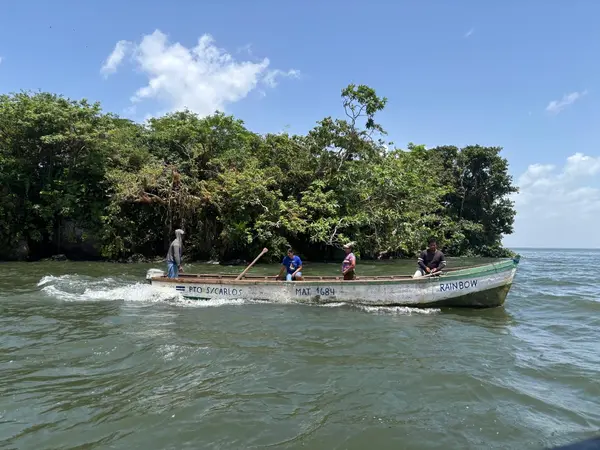
pirate food attack
Our boat to Los Guatuzos National Park is a 4-hour slow cruise across Lake Cocibolca—the biggest lake in Central America. It feels like a sea, stretching almost to the horizon.
We can still see coastline very far on both sides, and some small islands in the direction we're heading.
The boat left perfectly on time—actually more than on time. Supposed to leave at 11, it actually departed at 10:57, with 3 people who had dropped their bags inside and gone for some quick purchases before the trip, waving frantically from the dock. But the captain is a good captain, and after leaving the dock, we simply approached another anchored boat, and the 3 people managed to climb aboard using it as a bridge.
There's just a gentle breeze, no waves. Our small engine pushing this ton of boat makes for very slow cruising. People are completely chilled—in fact, so relaxed that some have hung their hammocks and just swing with the boat's rocking motion. I love it.
After an hour of traveling, we reach one of the first small islands we'd been seeing. Must be less than 1 square kilometer—really tiny. I wonder if there will be any animals there, when from around the corner of the island, a small dinghy appears with 4 people onboard.
Our boat slows down and passengers stand up from their seats to look at them.
"Pirates!" I tell the kids, who almost get scared.
The dinghy moors alongside ours, but they're good pirates who bring food and drinks. The food consists of fried chicken or fried fish, wrapped in banana leaves with half-baked plantains. Drinks are cola and some weird pink liquid in plastic bottles, which we don't dare to taste.
We go for the fish, which is actually pretty good.
Fresh fish delivered right to your boat.
We can still see coastline very far on both sides, and some small islands in the direction we're heading.
The boat left perfectly on time—actually more than on time. Supposed to leave at 11, it actually departed at 10:57, with 3 people who had dropped their bags inside and gone for some quick purchases before the trip, waving frantically from the dock. But the captain is a good captain, and after leaving the dock, we simply approached another anchored boat, and the 3 people managed to climb aboard using it as a bridge.
There's just a gentle breeze, no waves. Our small engine pushing this ton of boat makes for very slow cruising. People are completely chilled—in fact, so relaxed that some have hung their hammocks and just swing with the boat's rocking motion. I love it.
After an hour of traveling, we reach one of the first small islands we'd been seeing. Must be less than 1 square kilometer—really tiny. I wonder if there will be any animals there, when from around the corner of the island, a small dinghy appears with 4 people onboard.
Our boat slows down and passengers stand up from their seats to look at them.
"Pirates!" I tell the kids, who almost get scared.
The dinghy moors alongside ours, but they're good pirates who bring food and drinks. The food consists of fried chicken or fried fish, wrapped in banana leaves with half-baked plantains. Drinks are cola and some weird pink liquid in plastic bottles, which we don't dare to taste.
We go for the fish, which is actually pretty good.
Fresh fish delivered right to your boat.
I no like green frogs
15 July 2025
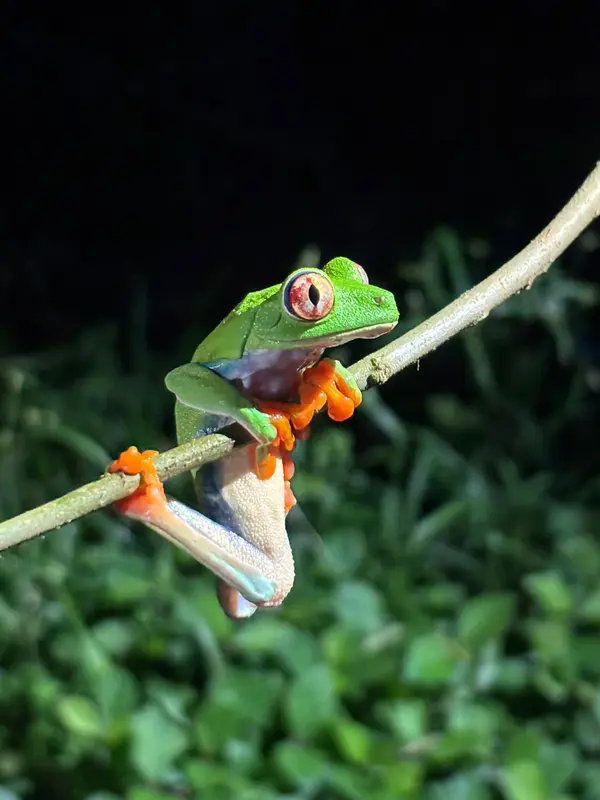
boring
Los Guatuzos. A word so simple I can't remember how to spell it, so every time I Google it again.
A wooden cabaña with mosquito nets sits facing the river. There's a small porch where we sit on wooden seats shaped like logs and look for animals. Not other people—I know the world is full of those—but proper jungle ones: howler monkeys, capuchins, hummingbirds, herons, and basilisks (the green lizards who dare to fight God's singularity by walking on water).
It's truly amazing, just seeing so many of them without even doing a tour—like the one we're actually doing tonight.
So after dinner, we look for Arturo, who's not there but probably hunting, and we board the boat with Indiana Jones to spot some of the wildest animals we've ever seen. "Indiana" is our local guide—real name Armando—and he's unbelievable. He and one of the women from the family hosting us drive the boat, almost bumping into caimans' heads. We see plenty of them, both in the water and on the riverbanks.
At some point, he pulls an almost meter-long caiman turtle from the water—a massive guy with big teeth that even panthers seem scared of—and he's holding it by the neck. How he even managed to spot it in the water remains a mystery to us.
The kids are having a ball with caimans and big turtles, though they're slightly annoyed by the amount of mosquitoes and insects flying into our faces. And it's getting late, considering we arrived here after 1.5 days of travel.
So their happiness gets somewhat dampened when we stop the boat and go walking. In the jungle. At night. In the middle of thousands of mosquitoes. Following our guide Armando, who hacks a path with his machete for us to pass.
"We go see frogs," he announces.
“We go see cool frogs”, I say to my son
"I don't care about frogs," says my son.
Come on, they're the cool ones—green with red eyes—and our guide spots one. Which is incredibly cool: he snaps off the branch where the frog is sitting and hands it to my kids, who stare eye-to-eye with this beauty of nature.
And we walk more.
"More frogs," says Armando.
"More cool frogs," I tell my son.
"I no like green frogs, I no like frogs, they boring!" he starts shouting, having reached the peak of tiredness. This turns almost to hysteria as he can't stop flies from swarming all over him. "I wanna go home!" while we explain that home is a sticky, hot cabaña full of mosquitoes that we can only reach with more walking and another boat ride.
I carry my son in my arms—he's almost falling asleep while I'm also being eaten alive by flies and mosquitoes.
And best of all: we finish the water.
Now my daughter turns hysterical: "I'm going to die!" which is possible if Armando wasn't with us.
So it's 10 PM, 2 kids crying, no water, and mosquitoes: plenty.
Wild animals: plenty.
We saw more red-eyed frogs, some dead very rare snake, tarantulas, more caimans, some weird mammal up in a tree making strange noises.
Yes, I studied ornithology.
A wooden cabaña with mosquito nets sits facing the river. There's a small porch where we sit on wooden seats shaped like logs and look for animals. Not other people—I know the world is full of those—but proper jungle ones: howler monkeys, capuchins, hummingbirds, herons, and basilisks (the green lizards who dare to fight God's singularity by walking on water).
It's truly amazing, just seeing so many of them without even doing a tour—like the one we're actually doing tonight.
So after dinner, we look for Arturo, who's not there but probably hunting, and we board the boat with Indiana Jones to spot some of the wildest animals we've ever seen. "Indiana" is our local guide—real name Armando—and he's unbelievable. He and one of the women from the family hosting us drive the boat, almost bumping into caimans' heads. We see plenty of them, both in the water and on the riverbanks.
At some point, he pulls an almost meter-long caiman turtle from the water—a massive guy with big teeth that even panthers seem scared of—and he's holding it by the neck. How he even managed to spot it in the water remains a mystery to us.
The kids are having a ball with caimans and big turtles, though they're slightly annoyed by the amount of mosquitoes and insects flying into our faces. And it's getting late, considering we arrived here after 1.5 days of travel.
So their happiness gets somewhat dampened when we stop the boat and go walking. In the jungle. At night. In the middle of thousands of mosquitoes. Following our guide Armando, who hacks a path with his machete for us to pass.
"We go see frogs," he announces.
“We go see cool frogs”, I say to my son
"I don't care about frogs," says my son.
Come on, they're the cool ones—green with red eyes—and our guide spots one. Which is incredibly cool: he snaps off the branch where the frog is sitting and hands it to my kids, who stare eye-to-eye with this beauty of nature.
And we walk more.
"More frogs," says Armando.
"More cool frogs," I tell my son.
"I no like green frogs, I no like frogs, they boring!" he starts shouting, having reached the peak of tiredness. This turns almost to hysteria as he can't stop flies from swarming all over him. "I wanna go home!" while we explain that home is a sticky, hot cabaña full of mosquitoes that we can only reach with more walking and another boat ride.
I carry my son in my arms—he's almost falling asleep while I'm also being eaten alive by flies and mosquitoes.
And best of all: we finish the water.
Now my daughter turns hysterical: "I'm going to die!" which is possible if Armando wasn't with us.
So it's 10 PM, 2 kids crying, no water, and mosquitoes: plenty.
Wild animals: plenty.
We saw more red-eyed frogs, some dead very rare snake, tarantulas, more caimans, some weird mammal up in a tree making strange noises.
Yes, I studied ornithology.
Wakeboard
16 July 2025
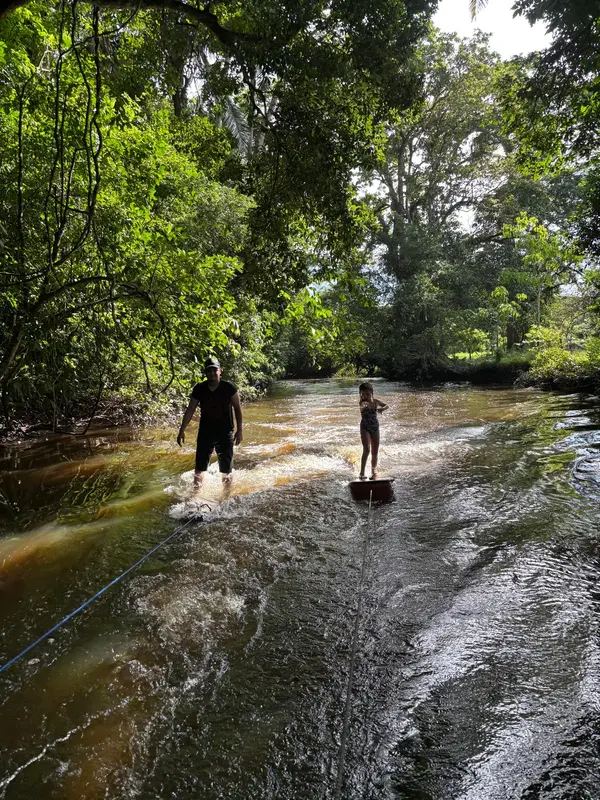
no caimans were harmed in the making of this
We wake up in the cabaña under our mosquito net with some mosquitoes inside the net with us—probably sheltering themselves from some other, bigger mosquitoes.
Actually, we didn't wake up. Howler monkeys did. If you've never heard them, Google it—like a guttural shouting that sounds like somebody is really taking the piss out of you.
And this is at 4 AM.
After kicking out some mosquitoes, we manage to snooze a bit more, and at 6:30 we're all up. Kids begging to watch the iPad, adults begging to see the same monkeys that woke us up 4 hours earlier. But no monkeys around the cabañas—only when you're trying to sleep.
We head for breakfast and then for a daily jungle tour.
The kids complain again when we start our walk because it's hot, and complain more when we take paths through thicker vegetation, which is even hotter and fuller of mosquitoes.
After 2 hours of flora and fauna, we take the boat back to the main house, seeing a couple more caimans basking on the riverbanks.
In the stretch of river in front of the house, kids are happily swimming. My daughter wants to swim too, and all I can think is, "What about Arturo?" (see previous story).
Our guide asks if the kids want to swim, and I ask him, "What about Arturo?"
He says it's fine—caimans (at this stage our count of caimans on the same river was probably around 30) are scared when many kids are in the water making noise, and I trust him. You need to trust somebody whose grandchildren are swimming there too.
So both my kids are happily swimming, diving, and playing with a canoe carved from a tree trunk. Armando looks at me and says, "Wild experience," smiling.
We have lunch, and I head back to our cabaña with my son while my wife and daughter stay to play around the family house.
After a while, I start wondering why they're late getting back, and when they finally return, I understand why.
Because we are crazy parents. Reckless parents. Will I get arrested when we're back in Ireland?
Well, luckily for me and my wife, I doubt there's any law that forbids parents from letting their kid do wakeboarding. On a river. Full of caimans.
And yes, to excuse my wife from any guilt, she was doing it as well. Wakeboarding. With caimans.
Actually, we didn't wake up. Howler monkeys did. If you've never heard them, Google it—like a guttural shouting that sounds like somebody is really taking the piss out of you.
And this is at 4 AM.
After kicking out some mosquitoes, we manage to snooze a bit more, and at 6:30 we're all up. Kids begging to watch the iPad, adults begging to see the same monkeys that woke us up 4 hours earlier. But no monkeys around the cabañas—only when you're trying to sleep.
We head for breakfast and then for a daily jungle tour.
The kids complain again when we start our walk because it's hot, and complain more when we take paths through thicker vegetation, which is even hotter and fuller of mosquitoes.
After 2 hours of flora and fauna, we take the boat back to the main house, seeing a couple more caimans basking on the riverbanks.
In the stretch of river in front of the house, kids are happily swimming. My daughter wants to swim too, and all I can think is, "What about Arturo?" (see previous story).
Our guide asks if the kids want to swim, and I ask him, "What about Arturo?"
He says it's fine—caimans (at this stage our count of caimans on the same river was probably around 30) are scared when many kids are in the water making noise, and I trust him. You need to trust somebody whose grandchildren are swimming there too.
So both my kids are happily swimming, diving, and playing with a canoe carved from a tree trunk. Armando looks at me and says, "Wild experience," smiling.
We have lunch, and I head back to our cabaña with my son while my wife and daughter stay to play around the family house.
After a while, I start wondering why they're late getting back, and when they finally return, I understand why.
Because we are crazy parents. Reckless parents. Will I get arrested when we're back in Ireland?
Well, luckily for me and my wife, I doubt there's any law that forbids parents from letting their kid do wakeboarding. On a river. Full of caimans.
And yes, to excuse my wife from any guilt, she was doing it as well. Wakeboarding. With caimans.
Back from the jungle - part I
17 July 2025
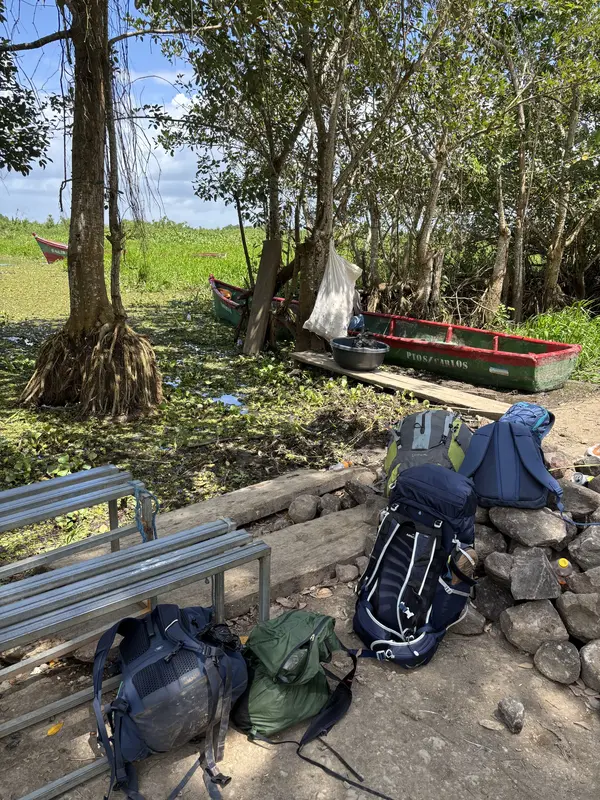
middle of nowhere, but a panga will bring us somewhere
The journey back from Los Guatuzos was something we had read a lot about but couldn't figure out.
Option #1:
- 4-hour slow boat
- 7-hour bus arriving in Managua around 9 PM
- Arrange taxi and hotel (no Uber; we're told Managua by night isn't ideal)
- Next day, 1 or 2 bus to El Tránsito (our next location)
Option #2 (locals only - no internet to verify):
- Lift from a truck to some random place close to the main lake
- Get a small boat which intercepts another bigger boat heading to Colón (southern point of Nicaragua reachable by car—end of the road—where electricity only arrived 3 months ago)
- Taxi to Cárdenas and hotel arranged by our host in Los Guatuzos
- Next day, bus to border and 2 more buses to El Tránsito via Managua
Complicated? Yes. Local? Yes. Can we confirm anything online? No.
So we decide to go this way.
A small truck with an open back arrives to pick us up. Well, not really to pick us up—they're picking up loads of plants. So while we'd initially figured we'd travel in the open back, the plants travel there, as the back is fully loaded with them. We ride in the front. There are 3 seats and somebody needs to drive, so my wife and I hold our kids for 1 hour on an absolutely hot, bumpy dirt track full of potholes and mud. Still, open windows, South American music vibes in the air whenever the radio picks up signal, and I'm happy with my cramps while holding my daughter and pushing her away from banging into the side door every time we hit a bump.
The road seems to come to an end—there are a few small boulders blocking it next to a pier (more than a pier, a few planks almost at water level), a small panga on a waterway fully covered by water grass, and nothing else. The driver helps us down, says good luck, and leaves.
We're in the middle of nowhere, no phone reception, alone under a tree with a small boat next to us, and we're heading where?
A small boy appears from the waterway, walking with water up to his neck. He approaches the boat, and I wait before asking him if we're completely lost. But instead of coming on land, he starts pulling the boat by hand back into the water. When I realize he's actually disappearing between the high grass into the lagoon, I shout "Colón?" (which is where we're heading) and he nods his head just before disappearing.
A man arrives from the same road we came on, walking alone with a big plastic basin. He confirms this is the way to Colón—I feel safer now—and tells me he's selling bread, coming down here every 8 days. On a boat. Back and forth.
After an hour's wait, finally the boy is back with the small panga full of people who come ashore with sacks of rice and other goods, as coming down from the bigger boat we need to take. We board then, and the panga travels 5 minutes through the waterways and high grass, approaching the larger boat. We moor alongside it and jump inside—just a few people in it.
Soon it's sailing out of this lagoon and back to the main lake, but waves make it rock side to side a lot, so much that things start to fall and some people wear life jackets. And it's not fun for my wife until we get more stable.
And when we do get more stable, the youngster leading the boat opens a wooden compartment with 2 buckets—1 small and 1 big. Inside the compartment, it's full of water. I mean, this is inside the boat. He fills the small bucket and with that fills the big bucket. He keeps going for like 20 minutes until he's satisfied the water level inside the boat doesn't exceed EU standards.
We travel like this for 4 hours, with a few stops (which means just driving the boat straight onto the sand and offloading people and/or goods).
Yes, I think we took the slightly more adventurous route.
Option #1:
- 4-hour slow boat
- 7-hour bus arriving in Managua around 9 PM
- Arrange taxi and hotel (no Uber; we're told Managua by night isn't ideal)
- Next day, 1 or 2 bus to El Tránsito (our next location)
Option #2 (locals only - no internet to verify):
- Lift from a truck to some random place close to the main lake
- Get a small boat which intercepts another bigger boat heading to Colón (southern point of Nicaragua reachable by car—end of the road—where electricity only arrived 3 months ago)
- Taxi to Cárdenas and hotel arranged by our host in Los Guatuzos
- Next day, bus to border and 2 more buses to El Tránsito via Managua
Complicated? Yes. Local? Yes. Can we confirm anything online? No.
So we decide to go this way.
A small truck with an open back arrives to pick us up. Well, not really to pick us up—they're picking up loads of plants. So while we'd initially figured we'd travel in the open back, the plants travel there, as the back is fully loaded with them. We ride in the front. There are 3 seats and somebody needs to drive, so my wife and I hold our kids for 1 hour on an absolutely hot, bumpy dirt track full of potholes and mud. Still, open windows, South American music vibes in the air whenever the radio picks up signal, and I'm happy with my cramps while holding my daughter and pushing her away from banging into the side door every time we hit a bump.
The road seems to come to an end—there are a few small boulders blocking it next to a pier (more than a pier, a few planks almost at water level), a small panga on a waterway fully covered by water grass, and nothing else. The driver helps us down, says good luck, and leaves.
We're in the middle of nowhere, no phone reception, alone under a tree with a small boat next to us, and we're heading where?
A small boy appears from the waterway, walking with water up to his neck. He approaches the boat, and I wait before asking him if we're completely lost. But instead of coming on land, he starts pulling the boat by hand back into the water. When I realize he's actually disappearing between the high grass into the lagoon, I shout "Colón?" (which is where we're heading) and he nods his head just before disappearing.
A man arrives from the same road we came on, walking alone with a big plastic basin. He confirms this is the way to Colón—I feel safer now—and tells me he's selling bread, coming down here every 8 days. On a boat. Back and forth.
After an hour's wait, finally the boy is back with the small panga full of people who come ashore with sacks of rice and other goods, as coming down from the bigger boat we need to take. We board then, and the panga travels 5 minutes through the waterways and high grass, approaching the larger boat. We moor alongside it and jump inside—just a few people in it.
Soon it's sailing out of this lagoon and back to the main lake, but waves make it rock side to side a lot, so much that things start to fall and some people wear life jackets. And it's not fun for my wife until we get more stable.
And when we do get more stable, the youngster leading the boat opens a wooden compartment with 2 buckets—1 small and 1 big. Inside the compartment, it's full of water. I mean, this is inside the boat. He fills the small bucket and with that fills the big bucket. He keeps going for like 20 minutes until he's satisfied the water level inside the boat doesn't exceed EU standards.
We travel like this for 4 hours, with a few stops (which means just driving the boat straight onto the sand and offloading people and/or goods).
Yes, I think we took the slightly more adventurous route.
Back from the jungle - part II
18 July 2025
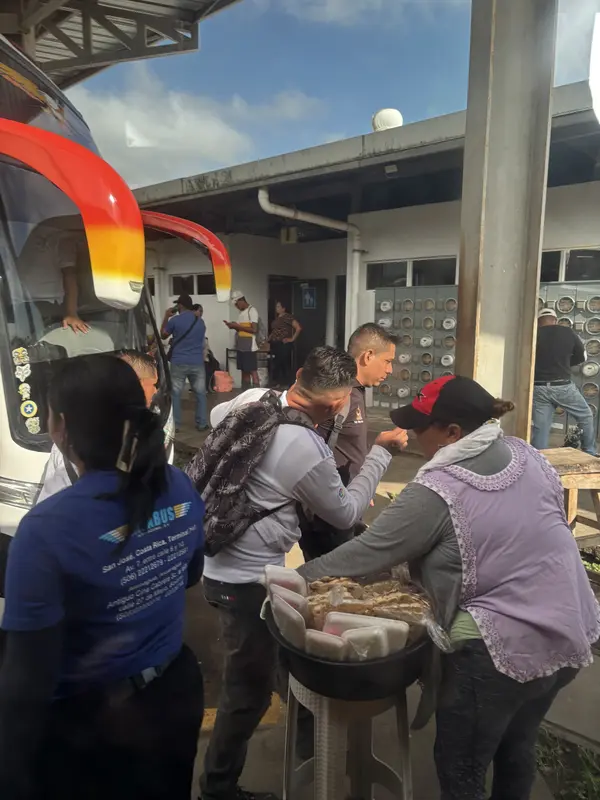
food is some serious business
Day 2 of our journey to El Tránsito.
Destination: surf and chill. And no more crazy buses for a while.
Our taxi picks us up at 6 AM, drives us to the border with Costa Rica, where we get seats on the bus to Managua—our first leg.
It's 7:30 AM, but vendors are doing amazing pitches for fried chicken and gallo pinto, so we go for it. A woman inside the bus takes orders and calls somebody who, after a few minutes, comes back with food. Very efficient. We even manage to order simple scrambled eggs with no onion, no spices, and the order comes back exactly as requested. Very efficient.
Before the bus leaves, a very poorly dressed man boards. He's blind, or anyway his eyes are closed and he moves around like a blind person without a stick. Not to be judgmental, but he stinks. He's standing exactly next to me, and when the bus leaves, he slowly pulls out a tin with some coins inside and a harmonica, and starts a small concert leaning on my seat. I'm not sure I can handle this for much longer. But I give him some small notes, and after 10 minutes he moves to the back of the bus.
Which breaks down after one hour of travel.
Commotion. Everybody gets off. People start asking the driver for money back. People are not happy. Seems no replacement bus is coming. After a few minutes of all standing outside, everybody starts moving a few meters ahead of the bus like they know something. And they do know something, because an empty bus arrives. So we scramble to get in while everybody's pushing to get a seat, and we manage to get one for us.
After 2 more hours, we arrive in Managua—at least on the outskirts. First day after a month that I'm getting tired of traveling. I'm sitting where the bus wheels are, so there's less space for my legs, and I have my big backpack in front of my seat and a smaller backpack on top. My daughter is leaning on me, and I'm sitting on the sunny side, melting and sweaty. We hit traffic and spend almost 2 more hours stuck in it. I'm really not enjoying this anymore.
We finally arrive at one of the main bus terminals.
But the next bus isn't leaving from the main terminal—it's leaving from some back street. After following a woman who kindly brings us there, we're sitting in a corner of a street where people tell us the last bus to El Tránsito can pass at 1:20, or 1:30, or 1:40, or 2:30. So we wait.
At some point, a bus arrives. Already full. But we need to board because it's the last one. Pushing, we manage to get on.
Two more hours on a bus, fully standing, in the heat, our 6 backpacks some on shoulders, some balanced between legs, holding children and getting squashed by vendors who walk through the bus aisle with massive baskets and bags of food.
After 2 days of traveling, that's exactly what we need. And I know it's always like this—the last part is more often the hardest.
After 1 hour, the road turns to dirt track, but at least the kids have managed at this point to get seats, leaving me and my wife to enjoy our last hour of bus standing.
The joy.
Destination: surf and chill. And no more crazy buses for a while.
Our taxi picks us up at 6 AM, drives us to the border with Costa Rica, where we get seats on the bus to Managua—our first leg.
It's 7:30 AM, but vendors are doing amazing pitches for fried chicken and gallo pinto, so we go for it. A woman inside the bus takes orders and calls somebody who, after a few minutes, comes back with food. Very efficient. We even manage to order simple scrambled eggs with no onion, no spices, and the order comes back exactly as requested. Very efficient.
Before the bus leaves, a very poorly dressed man boards. He's blind, or anyway his eyes are closed and he moves around like a blind person without a stick. Not to be judgmental, but he stinks. He's standing exactly next to me, and when the bus leaves, he slowly pulls out a tin with some coins inside and a harmonica, and starts a small concert leaning on my seat. I'm not sure I can handle this for much longer. But I give him some small notes, and after 10 minutes he moves to the back of the bus.
Which breaks down after one hour of travel.
Commotion. Everybody gets off. People start asking the driver for money back. People are not happy. Seems no replacement bus is coming. After a few minutes of all standing outside, everybody starts moving a few meters ahead of the bus like they know something. And they do know something, because an empty bus arrives. So we scramble to get in while everybody's pushing to get a seat, and we manage to get one for us.
After 2 more hours, we arrive in Managua—at least on the outskirts. First day after a month that I'm getting tired of traveling. I'm sitting where the bus wheels are, so there's less space for my legs, and I have my big backpack in front of my seat and a smaller backpack on top. My daughter is leaning on me, and I'm sitting on the sunny side, melting and sweaty. We hit traffic and spend almost 2 more hours stuck in it. I'm really not enjoying this anymore.
We finally arrive at one of the main bus terminals.
But the next bus isn't leaving from the main terminal—it's leaving from some back street. After following a woman who kindly brings us there, we're sitting in a corner of a street where people tell us the last bus to El Tránsito can pass at 1:20, or 1:30, or 1:40, or 2:30. So we wait.
At some point, a bus arrives. Already full. But we need to board because it's the last one. Pushing, we manage to get on.
Two more hours on a bus, fully standing, in the heat, our 6 backpacks some on shoulders, some balanced between legs, holding children and getting squashed by vendors who walk through the bus aisle with massive baskets and bags of food.
After 2 days of traveling, that's exactly what we need. And I know it's always like this—the last part is more often the hardest.
After 1 hour, the road turns to dirt track, but at least the kids have managed at this point to get seats, leaving me and my wife to enjoy our last hour of bus standing.
The joy.
Oxymoron
20 July 2025
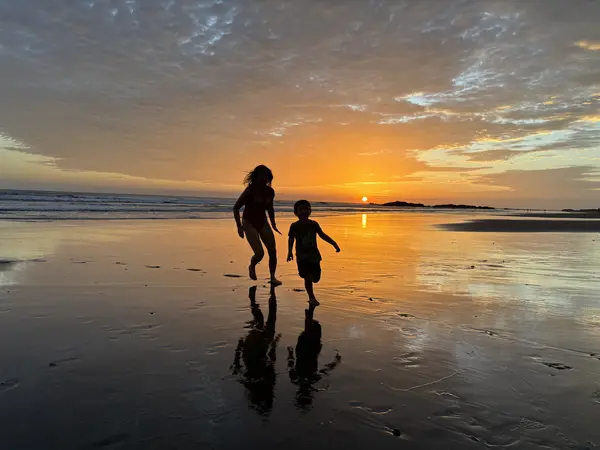
sunshine bliss
You cannot get stuck in a place called El Tránsito—literal translation: "In Transit."
But we decided to get stuck exactly here, making this small place our longest stay: 2 weeks of hopefully surf and quality beach time.
We also wonder about the name, considering this small fishing village sits at the end of a 12-kilometer dirt road with nowhere further to go. The land around is mostly pasture and green hills, so we thought we'd have loads of fresh fruit and vegetables. Instead, it's exactly the opposite.
The shops have limited resources, and for the first few days we wonder if we'll survive on pasta, frozen chicken, eggs, and tomatoes, considering ourselves lucky to have found a watermelon.
But slowly we learn: the biggest shop (don't expect a big shop at all) gets deliveries twice per week, and a small truck with fruit and vegetables visits the town also twice per week—locals not even knowing when it will pass. And if you miss it because you're at the beach, then you miss it and wait a few more days.
But it's a fishing village. When I go surfing at 6 AM, boats are coming back from their night catch, so when I finish my session, I just walk over to them and get some fresh fish for just a few euros' worth.
One day chicken, one day fish, and when vegetables arrive, we stock up (potatoes, peppers, and once we even find eggplant, which totally changes our diet in an exotic way).
And we surf, morning and evening.
And we discover brilliant rock pools with baby lobsters and one puffer fish that we go say hello to every day.
And we play in the waves with the kids.
Not bad getting stuck in El Tránsito.
But we decided to get stuck exactly here, making this small place our longest stay: 2 weeks of hopefully surf and quality beach time.
We also wonder about the name, considering this small fishing village sits at the end of a 12-kilometer dirt road with nowhere further to go. The land around is mostly pasture and green hills, so we thought we'd have loads of fresh fruit and vegetables. Instead, it's exactly the opposite.
The shops have limited resources, and for the first few days we wonder if we'll survive on pasta, frozen chicken, eggs, and tomatoes, considering ourselves lucky to have found a watermelon.
But slowly we learn: the biggest shop (don't expect a big shop at all) gets deliveries twice per week, and a small truck with fruit and vegetables visits the town also twice per week—locals not even knowing when it will pass. And if you miss it because you're at the beach, then you miss it and wait a few more days.
But it's a fishing village. When I go surfing at 6 AM, boats are coming back from their night catch, so when I finish my session, I just walk over to them and get some fresh fish for just a few euros' worth.
One day chicken, one day fish, and when vegetables arrive, we stock up (potatoes, peppers, and once we even find eggplant, which totally changes our diet in an exotic way).
And we surf, morning and evening.
And we discover brilliant rock pools with baby lobsters and one puffer fish that we go say hello to every day.
And we play in the waves with the kids.
Not bad getting stuck in El Tránsito.
Scorpion
24 July 2025
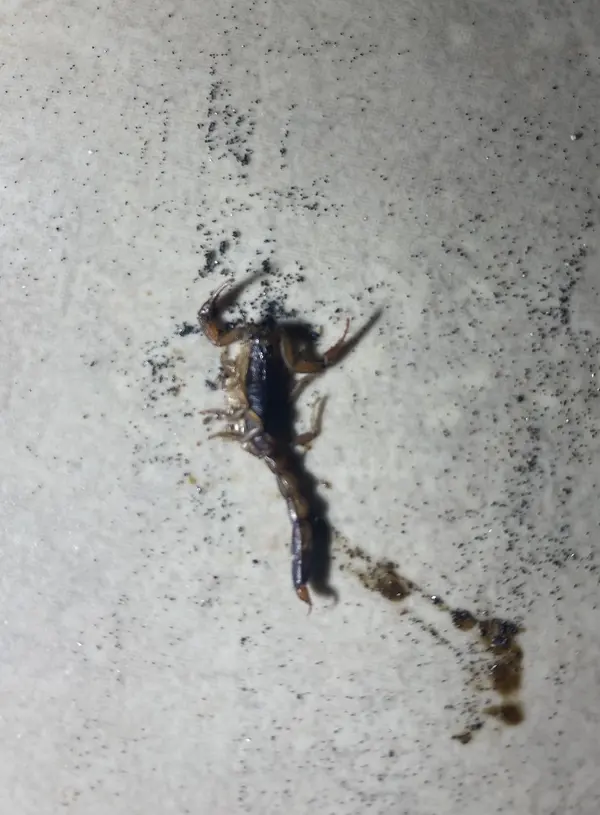
splat
You might guess where this story is heading...
We come back after a beer and some food at the main El Tránsito beach. It's a 20-minute walk, which can be anything from 20, 40, or 50 minutes with kids, depending on their level of tiredness or how many crabs we chase. And because it's already dark, there are lots of crabs to be chased.
In fact, it's later than usual when we get back. My daughter is very tired, which she rarely complains about, so when we arrive home, we rush her and her brother into the shower.
My daughter, just out of the shower, starts shouting and crying.
"Aaaaaah ahhhhhh! He pinched me! He pinched me!"
I look at her, thinking she's being dramatic because she's tired.
"Scorpion pinched me!"
She shouts while crying, so I run to her, and next to her there's a bloody scorpion—like 4cm, brown. So I smash him (bloody bastard, he's definitely a he) and try to calm her down, but she's rightfully hysterical.
My wife arrives as well, and my brain starts to accelerate.
The day before, I'd asked the woman from the shop near our accommodation if there was a doctor here, and she'd replied, "Mmm, not really sure. You'll have to ask." I'd wondered, "You live here and you don't know? Who should I ask?"
I call our local contact for the hostel we're staying at, and he tells me it's very painful and to look out for worse symptoms like allergic reactions. At least he says there's a doctor on holiday for the weekend, and he could drive her there on a bike, which, as bad as it could go, is already reassuring.
I ChatGPT symptoms and remedies and what the heck to do. We keep cool in front of her while I apply some ice, but my brain isn't just accelerating—it's a racing car.
There's no emergency services, no Uber, no taxi. The closest city is a 2-hour drive, and it's Managua, and it's 9 PM, and I bet at this stage even the last shop or restaurant where we are staying is closed.
I start to think: Am I a bad parent?
Swelling is almost none. Worse symptoms should appear within 30 minutes to 1 hour from the sting, so we keep her from sleeping (thanks, YouTube!) and use ice to relieve some pain.
After 1 hour with no other symptoms than some pain, she goes to sleep. And we stay wide awake.
But she sleeps all night well, and the next day, it's another adventure to tell.
We've been lucky—definitely more than the scorpion.
And the picture? Well, guess why I took it later and not before...
We come back after a beer and some food at the main El Tránsito beach. It's a 20-minute walk, which can be anything from 20, 40, or 50 minutes with kids, depending on their level of tiredness or how many crabs we chase. And because it's already dark, there are lots of crabs to be chased.
In fact, it's later than usual when we get back. My daughter is very tired, which she rarely complains about, so when we arrive home, we rush her and her brother into the shower.
My daughter, just out of the shower, starts shouting and crying.
"Aaaaaah ahhhhhh! He pinched me! He pinched me!"
I look at her, thinking she's being dramatic because she's tired.
"Scorpion pinched me!"
She shouts while crying, so I run to her, and next to her there's a bloody scorpion—like 4cm, brown. So I smash him (bloody bastard, he's definitely a he) and try to calm her down, but she's rightfully hysterical.
My wife arrives as well, and my brain starts to accelerate.
The day before, I'd asked the woman from the shop near our accommodation if there was a doctor here, and she'd replied, "Mmm, not really sure. You'll have to ask." I'd wondered, "You live here and you don't know? Who should I ask?"
I call our local contact for the hostel we're staying at, and he tells me it's very painful and to look out for worse symptoms like allergic reactions. At least he says there's a doctor on holiday for the weekend, and he could drive her there on a bike, which, as bad as it could go, is already reassuring.
I ChatGPT symptoms and remedies and what the heck to do. We keep cool in front of her while I apply some ice, but my brain isn't just accelerating—it's a racing car.
There's no emergency services, no Uber, no taxi. The closest city is a 2-hour drive, and it's Managua, and it's 9 PM, and I bet at this stage even the last shop or restaurant where we are staying is closed.
I start to think: Am I a bad parent?
Swelling is almost none. Worse symptoms should appear within 30 minutes to 1 hour from the sting, so we keep her from sleeping (thanks, YouTube!) and use ice to relieve some pain.
After 1 hour with no other symptoms than some pain, she goes to sleep. And we stay wide awake.
But she sleeps all night well, and the next day, it's another adventure to tell.
We've been lucky—definitely more than the scorpion.
And the picture? Well, guess why I took it later and not before...
Barber
26 July 2025
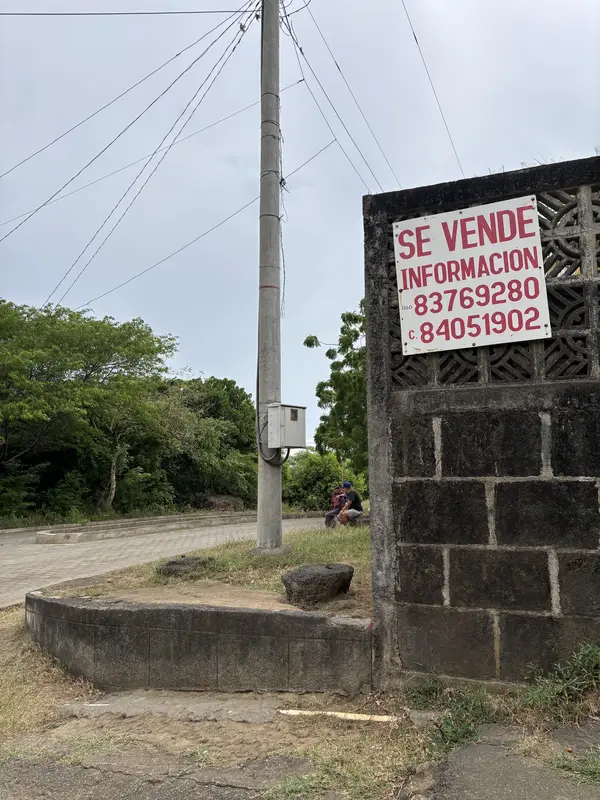
I try to call about buying information on why barber did not want to cut my hair but nada
After 4 weeks of traveling, my hair is longer than usual. And my beard is properly wild, rough, and itchy.
We've been moving around a lot, and I haven't found time to go to a barber yet. During our longer stay of two weeks in El Tránsito, I see the remote possibility of this happening.
The thing is, I'm surfing early morning, then my wife surfs, then we're cooking lunch, and then it's 35 degrees and I'm already melting in the shade before 4 PM when we go surfing again. So funny to say, but I don't have much time to go to the barber.
After one week, we finally have a cloudy day, and I find the courage to spare those 15-20 minutes to visit the barber.
I was told there is one, so I start asking around. The directions are vague even though the town is pretty small. After asking 4 different people who give me responses like "agua, agua" or "fire," I finally reach the barber.
It's one of those open-air barbers, meaning the barbershop is on the open veranda of a house. There's even the blue and red pole to mark it.
Next to the house/barbershop, there's a wooden house with a dirt floor and tin roof, and a veranda where a young guy and 2 older men are slowly swinging in their hammocks. They barely reply to my greeting, which is strange since people here are very friendly.
They barely look at me while a small boy appears, and I tell him that I need a haircut.
I wait a few minutes, and while I wait, flies are all over me. Not sure why—maybe lack of wind or the whiteness of my skin—but they keep sticking to my face, and I swat them away non-stop.
I wonder: how can I stay put while the barber does his job if I have so many flies pestering me?
When the kid comes back telling me "Mañana" (which means tomorrow), two thoughts come to mind:
One. It's 4 PM on a normal weekday. Here, businesses open late and close early, but why mañana and not today? What could keep him so busy when he could get more money from a foreigner than a local? This is first-world thinking.
Two. For the better—I couldn't have handled those flies anyway! And this is also first-world thinking.
We've been moving around a lot, and I haven't found time to go to a barber yet. During our longer stay of two weeks in El Tránsito, I see the remote possibility of this happening.
The thing is, I'm surfing early morning, then my wife surfs, then we're cooking lunch, and then it's 35 degrees and I'm already melting in the shade before 4 PM when we go surfing again. So funny to say, but I don't have much time to go to the barber.
After one week, we finally have a cloudy day, and I find the courage to spare those 15-20 minutes to visit the barber.
I was told there is one, so I start asking around. The directions are vague even though the town is pretty small. After asking 4 different people who give me responses like "agua, agua" or "fire," I finally reach the barber.
It's one of those open-air barbers, meaning the barbershop is on the open veranda of a house. There's even the blue and red pole to mark it.
Next to the house/barbershop, there's a wooden house with a dirt floor and tin roof, and a veranda where a young guy and 2 older men are slowly swinging in their hammocks. They barely reply to my greeting, which is strange since people here are very friendly.
They barely look at me while a small boy appears, and I tell him that I need a haircut.
I wait a few minutes, and while I wait, flies are all over me. Not sure why—maybe lack of wind or the whiteness of my skin—but they keep sticking to my face, and I swat them away non-stop.
I wonder: how can I stay put while the barber does his job if I have so many flies pestering me?
When the kid comes back telling me "Mañana" (which means tomorrow), two thoughts come to mind:
One. It's 4 PM on a normal weekday. Here, businesses open late and close early, but why mañana and not today? What could keep him so busy when he could get more money from a foreigner than a local? This is first-world thinking.
Two. For the better—I couldn't have handled those flies anyway! And this is also first-world thinking.
Push it
28 July 2025
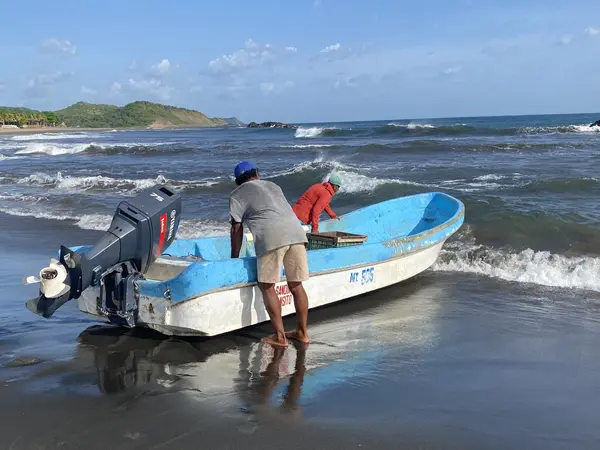
photo taken while lazy european takes pictures instead of helping
Every once in a while, from our place which is basically 30 seconds from the beach, you can hear an engine spinning and then BOOM. A big thud.
That's how fishermen come ashore.
Across El Tránsito, Nicaragua—and not only here—most fishermen use fiberglass narrow pangas, around 8 meters long with powerful engines and very bright colors.
These boats are moved across the beach using 2 large wooden logs with handles, which allow the boat to move a few meters. Then one of the logs is moved to the other side, shifting one log then the other until the boat is close to the water and can be pushed by hand when a wave comes.
When the boat needs to get back to shore after all-night fishing, the driver just points at the beach and arrives at full speed, sometimes driving more than 15 meters inland.
BOOM. A big thud.
And then more pushing.
It's tough work by tough people who are so smiley when I meet them every morning—they're just back from fishing while I'm going to fish some waves. In general, people in Nicaragua always greet you and always smile at you.
One morning I'm back early from surfing, around 7 AM when they're just back on shore, so I drop my board on the sand and help them push the boat further inland where high tide won't grab it back. And it weighs a ton—it's 4 of us pushing it on these logs on the steep part of the beach, and my feet just sink back into the sand.
After I help them, I say goodbye, then turn back and ask them if they have some fish.
Of course they do. They didn't thank me for the push (I mean, they couldn't care less—they would have pushed it anyway), so I don't think the price is for that.
Because the price is unbelievably cheap. Two already-cleaned fish, each one as wide as a decent pan, for only one dollar.
My push was worth it.
That's how fishermen come ashore.
Across El Tránsito, Nicaragua—and not only here—most fishermen use fiberglass narrow pangas, around 8 meters long with powerful engines and very bright colors.
These boats are moved across the beach using 2 large wooden logs with handles, which allow the boat to move a few meters. Then one of the logs is moved to the other side, shifting one log then the other until the boat is close to the water and can be pushed by hand when a wave comes.
When the boat needs to get back to shore after all-night fishing, the driver just points at the beach and arrives at full speed, sometimes driving more than 15 meters inland.
BOOM. A big thud.
And then more pushing.
It's tough work by tough people who are so smiley when I meet them every morning—they're just back from fishing while I'm going to fish some waves. In general, people in Nicaragua always greet you and always smile at you.
One morning I'm back early from surfing, around 7 AM when they're just back on shore, so I drop my board on the sand and help them push the boat further inland where high tide won't grab it back. And it weighs a ton—it's 4 of us pushing it on these logs on the steep part of the beach, and my feet just sink back into the sand.
After I help them, I say goodbye, then turn back and ask them if they have some fish.
Of course they do. They didn't thank me for the push (I mean, they couldn't care less—they would have pushed it anyway), so I don't think the price is for that.
Because the price is unbelievably cheap. Two already-cleaned fish, each one as wide as a decent pan, for only one dollar.
My push was worth it.
Thoughts
21 June 2025
Day 0
21 June 2025
Days before Day 0
21 June 2025
Free beers
23 June 2025
Smile
24 June 2025
worth 2 dollars
29 June 2025
Panama
30 June 2025
40 dollars
1 July 2025
Long ride
2 July 2025
Formula
2 July 2025
Ray Charles
3 July 2025
Singing
3 July 2025
Plane
4 July 2025
Pollo
5 July 2025
Eggs
5 July 2025
Dark
8 July 2025
Foreign driftwood
7 July 2025
Carlito's way
8 July 2025
¡Buenos días!
10 July 2025
Crab
11 July 2025
Flying backpacks
11 July 2025
Adelante
12 July 2025
Fumarola
13 July 2025
Differences
14 July 2025
Portuaria
14 July 2025
Proverb
14 July 2025
Rough
15 July 2025
Back home
15 July 2025
The cure
15 July 2025
Arturo
15 July 2025
Pirates
15 July 2025
I no like green frogs
16 July 2025
Wakeboard
17 July 2025
Back from the jungle - part I
18 July 2025
Back from the jungle - part II
20 July 2025
Oxymoron
24 July 2025
Scorpion
26 July 2025
Barber
28 July 2025
Push it
About
I just crave travelling.. that's about it...
I was born in sardinia, I live in Ireland, my wife is Polish and my kids are irish...
I want live here and I want to live there..I want to live everywhere..
..or at least explore as much as I can...
Subscribe
I cannot promise, but I might send you an email from time to time whenever I publish something new...
You really dont want spam from me? unsubscribe anytime.